

Connect with your community and watch it grow
List your hall on Vennu and make managing your space simple, efficient, and impactful.
A Smarter Way to Manage Your Church Hall
Vennu is the easiest way to connect your space with your community. Whether you're looking to reduce admin time, increase bookings, or create new opportunities for connection, our platform has you covered.
WITH VENNU, YOU GET:
• Real-time enquiry and booking tracking
• Secure online payments direct to your nominated account
• Custom listings with photos and key details
• Easy change and cancellation management
• Automated recurring bookings for regular events
• A live availability calendar
• Targeted digital marketing to boost visibility
• Friendly support, 7 days a week
“Working with the Vennu platform has enabled us to offer our various spaces to a wider audience, including a recent event featuring popular Kiama folk group The Water Runners, and including the link to Vennu on our website has also made hiring the spaces an easy option.”
Janet Brentnall, Booking Officer Berry Uniting Church
WHY CHURCHES CHOOSE VENNU:
• Spend less time on admin – focus on what matters
• Turn idle space into valuable income
• Reach more people and grow your bookings
• Foster deeper community engagement
• Revitalise underused spaces with new activity and energy
Be part of something bigger. Share your space. Strengthen your community. No upfront costs No lock-in contracts Set up in minutes


WELCOME FROM THE GENERAL SECRETARY
Change occurs at the speed of trust , and trust occurs at the speed of relationships
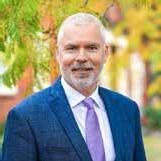
REV. DR PETER WALKER GENERAL SECRETARY
THE GENERAL SECRETARY IS APPOINTED BY THE SYNOD TO PROVIDE LEADERSHIP TO THE CHURCH BY ACTIVELY ENGAGING IN STRATEGIC THINKING ABOUT THE LIFE, DIRECTION, VISION AND MISSION OF THE CHURCH.
I have been humbled by people taking time to wish me well. I am very grateful. I see the General Secretary as a servant of the council of the church we name the Synod of NSW and the ACT. Given we know whose council and church this is, we can also say together that we are servants of Jesus Christ.
Thank you for your willingness to be together with me in this next phase of my ministry as a servant of Christ. I assure you of my commitment to be together with you in all we seek to accomplish in the coming years. That togetherness is what strengthens me for the changes, personal and institutional, that lie ahead.
There is a saying among community organisers that goes something like this: Change occurs at the speed of trust, and trust occurs at the speed of relationships. We are an inter-conciliar church, and relationships are everything to us. Relationships are not made by Regulations or Bylaws. They cannot be forced; they can only be formed. They are formed by trust. Relationships are the invisible glue that is holding us together. Relationships of trust, with one another and in God’s call, are how the Uniting Church was formed. If there is such a thing as a founding charism of the Uniting Church, it is the commitment to unity, a commitment to being inter-related, a commitment to relationship. And, above all those reasons in its importance, relationships are the way that we, individually and as the church, bear the image of God in the world.
above all our relationship with Christ, calls for every bit as much attention as the hardware of our structures.
FORMING DISCIPLES IS ABOUT WELCOMING THOSE CHRIST IS ALREADY BESIDE
There was a higher reason for the vision of new relationships that led to the formation of the Uniting Church. As we know, that coming together was not to make the churches more efficient, better organised, differently structured, or to feel good about becoming relevant and moving ahead with the times. The relationships that led to the trust, that in time led to the change that we call the Uniting Church in Australia, occurred for the sake of the Gospel. Among our founders’ inspirations was the message of John 17 – that we may be one, in order that the world might believe. The reason the Uniting Church came into being was not (and is not) about us.
I have come to view the change to our current presbyteries as having a single purpose: so that our local congregations, communities, and lay and ordained ministers are less tangled in structures and freer to find joy in welcoming new disciples. Forming disciples is not an expression of ecclesial or spiritual ego. It is about welcoming those Christ is already beside. It is an invitation to deepen a relationship God began in them well before us and which – we pray – God will deepen through us.
Among my priorities moving into this ministry is to be focused on relationships. I hope to do that personally, by giving as much time as I can to be with congregations and presbyteries. And I am committed to doing that institutionally, by strengthening as best I can the relationships between the councils of the church. By focusing on relationships, I hope we will deepen trust. And by deepening trust, I hope we will see what faithful change in following the call of Jesus Christ looks like - and walk toward those changes together.
I have tired some of you enough already with my current favourite analogy, yet I will risk using it again. Relationships are the software of the church, and our structures are the hardware. It is the same in the church as it is with any computer: if our software is not right, no amount of tinkering with the hardware can help us. The software of our relationships, and
Perhaps the reason for presbyteries coming together in this Synod is not about us – not about our structures. Instead, this next generation of coming together, like the first in 1977, is something we will accomplish so that, by our visible unity, the world might believe that God is doing something special among us. Not special as in, ‘Please come and congratulate us on what we are achieving’. Special, rather, because we are embodying relationships of trust in each other and in God in a world where so many relationships are coming apart. We are striving to become a sign of that fellowship of reconciliation that is the end in view for the whole creation. In honesty, we know our striving is matched by an equal measure of stumbling. Yet placing our trust in the One who is utterly trustworthy, we will not lose our way.





MODERATOR’S REFLECTION
Gratitude and Renewed Confidence
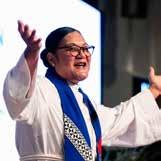
REV. FAAIMATA HAVEA HILIAU MODERATOR
After three intense days, I left the Synod meeting in 2025 feeling tired—but hopeful. Physically and mentally drained, yes. But full of deep gratitude and renewed confidence in the Church and its future.
What we discerned together at Synod matters. We asked bold questions about who we are as a church and what kind of future we’re walking toward. And the truth is, what people brought into that room—their stories, prayers, doubts, hopes, and honest wrestling—was enough. It was more than enough.
WE MADE SPACE FOR THE SPIRIT TO MOVE. WE REMEMBERED WHAT IT MEANS TO BE THE CHURCH
We also elected a new General Secretary, Rev. Dr. Peter Walker. He’s someone with a clear sense of calling and a commitment to the life and work of the Uniting Church. These two leaders have a big task ahead of them, especially in helping bring our Synod decisions to life. The decisions we made were just the beginning. Now comes the harder work—actually living into them.
Follow the Moderator on instagram:
instagram.com/moderator_ucanswact
Together, we named some of the changes we need to make. And we made them. Those decisions weren’t just about policies or structures. They were about the kind of community we want to be. A community that’s open to being transformed by God—and ready to be part of transforming the world around us.
That’s what excites me. That we are part of something much bigger than ourselves. We are part of the transforming community of God.
One of the great joys of Synod is simply being together. It only happens every 18 months, so there’s always a sense of reunion. But this year, something different stood out. There were so many new faces. So many younger voices around the table. That kind of presence matters. It shapes how we see the church— not as something fading, but as something changing, moving, growing.
It was encouraging to look across the room and see such a wide range of people. Culturally diverse. Intergenerational. People from every corner of our Synod. It reminded me again that the Uniting Church doesn’t belong to one age group or background. It’s all of us, together.
We also welcomed new leaders who will help guide us through this next season. A new Moderator-Elect, Rev. Pablo Nunez. As someone standing in this space, I can say t’s not an easy task, but it is immensely rewarding and humbling. I am genuinely hopeful for what Pablo will bring—his voice, his heart, his gifts.
I don’t want to gloss over how difficult some of that work will be. But I do want to say this: we are not alone in it. I believe God is at work among us. I felt it at Synod. I saw it. In conversations that changed direction. In decisions that seemed impossible but were made anyway. In the shared silences. In prayer. In worship. In the laughter and tears between sessions.
Some might call those moments lucky. I call them miracles.
I want to be clear—I’m not saying the Church is perfect, or that we’ve suddenly solved every challenge. We haven’t. But something important happened at Synod this year. We made space for the Spirit to move. We chose to listen to each other, even when it was hard. We remembered what it means to be the Church: to worship, to witness, and to serve.
And now, we carry that with us. Into our congregations, our communities, our workplaces, our homes.
It’s not going to be easy. But it will be worth it. Because the work ahead—building a Church that’s faithful, honest, inclusive, and responsive to God’s call—is holy work.
So yes, I’m tired. But more than that, I’m hopeful. And excited. Not because we have all the answers, but because I trust that what we have—who we are—is enough.
And God is not finished with us yet.
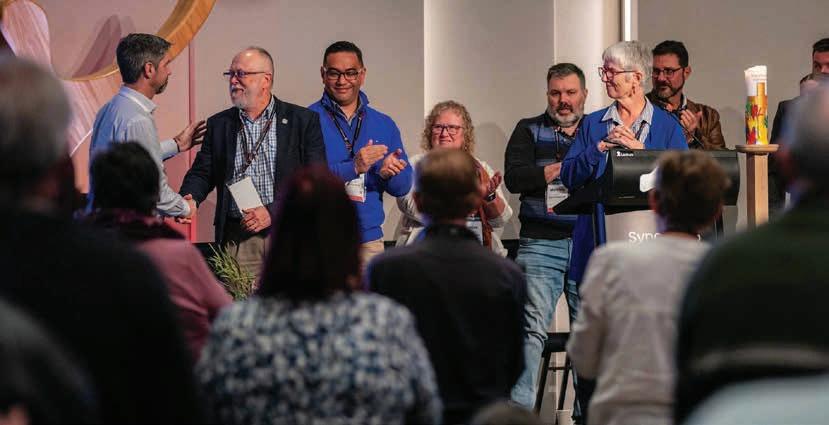
YOUR SAY...
WE’VE ROUNDED UP THE BEST COMMENTS THAT YOU’VE LEFT ONLINE. If you would like to leave a comment on an article or have a viewpoint to sharejust go online insights.uca.org.au and leave your comments.
IN RESPONSE TO THE POST RESHAPING PRESBYTERIES FOR A STRONGER FUTURE
Thank you to Rob McFarlane and the team for all your hard work over the last few years. We continue as pilgrim people seeking the will of God, seeking to support our people on the way. Now we all need to work through this transition, being brave and stepping out in faith! Bless you all for your willingness to lead us through this wilderness.
MARY BIRCH
IN RESPONSE TO THE POST REV. PABLO NUNEZ BRINGS GROUNDED FAITH AND VISION AS MODERATOR ELECT
So wonderful! Congratulations Pablo, you have faithfully followed Jesus and served those he has given you to care for . I know that this new season will be no different. Father God is the one who promotes, he protects and he also is the one to provide. I celebrate with you!
LAUREL TRAINOR
IN RESPONSE TO THE POST WHY STUDYING BIBLICAL LANGUAGES STILL MATTERS
I have always thought that a really strong reason for applying oneself to another language—biblical, or otherwise—is to begin to see things from a different perspective. In the case of the Bible, it starts to shift our perceptions to become more in line with the culture in which the words were written—and that alerts us to factors which are importantly in understanding “what it meant”, taking us away from “well I think that must mean …”
JOHN SQUIRES
IN RESPONSE TO THE POST FOUR IN FIVE TUVALUANS APPLY TO MOVE TO AUSTRALIA. FRAYZEL IS AMONG THEM
Cultural resettlement is essential, was the message from the Pasifica International Rural Churches Conference(Rural Ministry IRCA Oceania) at the end of May. Our friends need to be close to the sea, from which their identity is grounded and also welcomed by local churches. Australia is a secular country, whereas our Pacific friends and guest are from Christian Countries, where church is a way of life and tied into personal identity.
SUE ELLIS
IN RESPONSE TO THE POST A CALL TO PUBLIC WITNESS: WHY THE UNITING CHURCH SUPPORTS THE MARCH FOR HUMANITY
It was an honour to start the March with you, Moderator. I felt proud to be a member of the Uniting church. You said to someone "Thank you for having the courage to come today." I loved it. It does take courage to show up and walk out your prayers
NAOMI DOWNIE
IN RESPONSE TO THE POST ORANGE UNITING CHURCH AND VERITAS HOUSE PARTNER TO CREATE HOUSING FOR HOMELESS YOUTH
So good. This was a formative space for my faith, and love to se it being re-formed into a transformative space for others now!
CHRIS ROWNEY
Rev. Jane Fry’s Legacy :
LEADERSHIP, TRUST, AND REAL CHANGE IN THE UNITING CHURCH SYNOD OF NSW AND ACT

As Rev. Jane Fry steps down as General Secretary of the Uniting Church Synod of NSW and the ACT, she leaves behind more than a job title. She leaves a Church shaped by bold ideas, honest reflection, and a willingness to do hard things for the sake of its future.
"This is my last Synod as the General Secretary." said Rev Jane Fry as she addressed the room. "I have been in this role for five Synods and it has been a learning journey, mostly uphill, occasionally vertical."
Since 2019, Rev. Fry’s leadership has been at the centre of major changes in how the Synod works, thinks, and serves. The Synod Standing Committee report to Synod 2025 shows just how far that journey has come—and what still needs to happen next.
At the Synod meeting she talked about a mantra that helped her to deal with particularly interesting people, challenging circumstances or intractable problems as the General Secretary. " The mantra is 'God's got this'!
One of Rev. Fry’s defining contributions was helping the church reimagine itself for growth. The 2019 Synod resolution committed the Church’s councils—from congregations to Synod—to reorganise for deeper relationship, stronger discipleship, more impact, and a renewed sense of purpose.
"The proposal in 2019 kicked off an enormous transformation in the life of this church, and it was in direct response to decisions made by this council. It was the Synod, my world getting ready to support a courageous, contemporary, growing church."
This led to the Future Directions framework, adopted in 2021, which now guides everything the Synod does. Its vision is for a courageous, contemporary, growing church which prioritises rural and regional ministry, Walking Together with
First Peoples and the covenant with Congress , ministry with younger people and those in the first third of their lives, environmental advocacy and action, and working with Presbyteries to stimulate growth in and through congregations. It also prioritises better governance, smarter use of resources, and unity across the Synod.
Rev. Fry didn’t just champion these goals—she worked to embed them. Under her leadership, the Synod embarked on the Presbytery Project, the Stewardship and Discernment Summits, and new resourcing models like the Growth Fund. These weren’t theoretical shifts. They aimed to meet the actual struggles of local churches: shrinking numbers, tired leaders, and complex compliance demands.
Rev. Fry doesn’t sugar-coat the challenges. The biggest? Congregations are struggling, and the systems meant to support them aren’t always working.
Rev. Fry is clear that Presbyteries—while important—can’t solve this alone. The health of congregations depends on more than good governance. It needs healthy leadership, both lay and ordained. But less than 60% of ordained ministers in the Synod serve in congregations. That gap isn’t just about money or placements. Rev. Fry argues it reflects a deeper confusion in the Church about what ordained ministry is—and why it matters.
Questions have been raised about trust. Trust between Synod and Presbyteries. Between leaders and
HER LEGACY IS NOT A FINISHED PROJECT. IT’S A PATH FORWARD—ONE MARKED A DEEP BELIEF THAT THE CHURCH CAN STILL MAKE A 'JESUSSHAPED DIFFERENCE IN THE WORLD'
local churches. Without trust, no structure or strategy will work. That’s why Rev. Fry has supported reforms to make the Synod Standing Committee more representative and accountable, especially if the Church moves to a three-Presbytery model.
Another legacy of Rev. Fry’s time as General Secretary is her constant focus on stewardship—not just of money, but of relationships and mission.
Rev. Fry often spoke frankly about the Synod’s financial reality: expenses are outpacing income. The Church has significant assets, but they can’t be used to patch short-term gaps. Instead, she argued, we need new models that generate income while freeing up congregations for ministry. This includes creative use of property and better resourcing for those doing the hard work on the ground.
Her metaphor is simple: too much of the Church’s “common wealth” is sitting in closed dams. What’s needed now is flowing water—streams that reach every corner of the Church’s life.
Rev. Fry’s tenure as General Secretary has been marked by steady leadership through uncertain times. The Church navigated COVID, cultural change and financial stress
Through it all, she kept asking the hard questions and holding the Church to its own values, but also never looked in the rear view mirror, looking forward and always acknowledging that God is in the details.
"We all have to contemplate and consider what we want to carry into our future."
Her legacy is not a finished project. It’s a path forward—one marked by courage, clarity, and a deep belief that the Church can still make a 'Jesus-shaped difference in the world.'
"Thank you for having me as General Secretary for the last nine years," she said at Synod. "If I say it's been an awful privilege, I hope you understand what I mean. It is a weighty role, and I am looking forward to handing it over into the hands of the next General Secretary".
Rev. Fry hands over the role to Rev. Dr. Peter Walker with a Church more aware of its problems—and more willing to face them. That, in itself, is a legacy worth naming.
ADRIAN DRAYTON
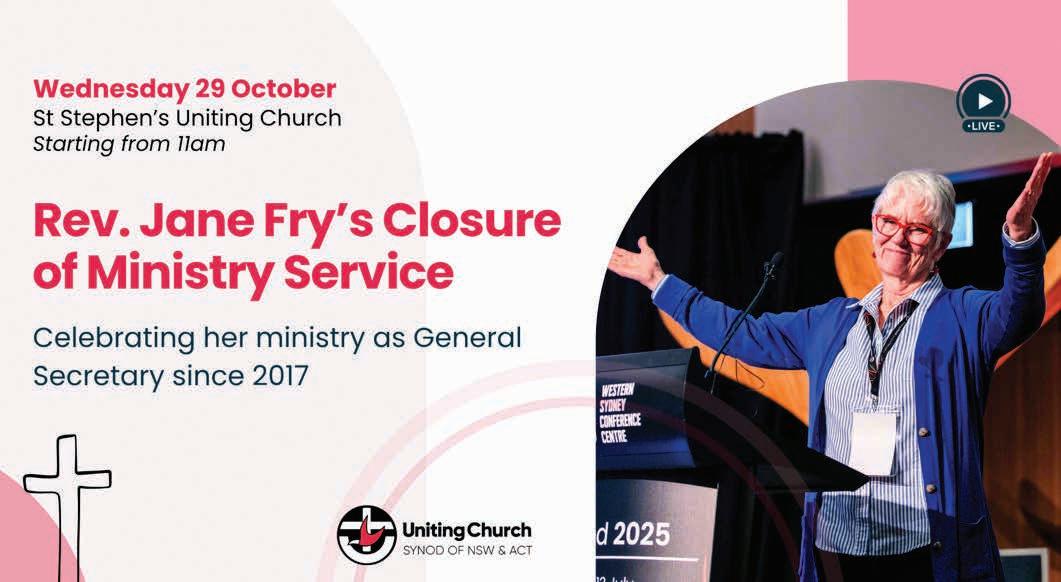
All are welcome!

THE AT TABLE WAY:
her
A NEW PATHWAY FOR WOMEN TO GATHER, GROW AND LEAD IN THEIR COMMUNITY
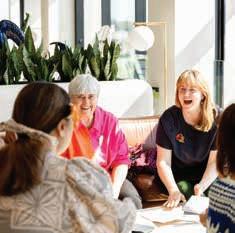
WHAT IS THE AT HER TABLE WAY?
The At Her Table Way is a leadership formation pathway for women who want to host gatherings in their own neighbourhoods. It’s not a Bible study or a leadership course in the traditional sense. It’s an invitation to women to step into leadership with grace, authenticity, and courage - rooted in relationships and community.
A TOOL FOR MISSION AND MINISTRY
For church leaders, this is more than a “women’s ministry” tool. It’s a way to invest in local placemakers, to foster leadership from the ground up, and to open your doors (or gardens, or cafés) to those who may never walk into a sanctuary but are hungry for belonging.
Over the past few years, I’ve had the privilege of sitting with women in church halls, cafés, lounge rooms, and around long tables across the country.
I’ve listened as they shared a common ache: a longing for deeper connection, meaningful conversation, and a safe place to explore life and faith side by side with others. From these conversations, a movement has quietly grown.
At Her Table began with a simple idea, to create beautiful, welcoming spaces where women could gather for open-hearted conversations. What I didn’t expect was how deeply this resonated, not only with women looking for connection, but with churches and ministries looking for a way to meaningfully engage their communities.
Today, I’m excited to share a new chapter in this journey: The At Her Table Way.
Participants are guided through four modules of at-home learning and faceto-face conversations in a Community of Practice. We explore themes like the power of intentional hospitality, creating safe and inclusive spaces, leading from your story, and navigating difference with grace. It’s a formation journey that encourages each woman to lead as she is - no title, degree, or “churchy” language required.
WHY THIS? WHY NOW?
Churches are asking big questions about how to meaningfully connect with women and their communities beyond Sunday. Mission programs often feel stretched, and traditional ministry models don’t always meet women where they are, in the busyness of life, the quiet of spiritual curiosity, or the ache of loneliness.
The At Her Table Way offers a gentle, relational approach. It’s not about filling programs; it’s about forming people. It equips women to host safe, spirit-filled gatherings that can be a gateway to deeper relationships, faith exploration, and local mission. It’s a model that can sit beautifully alongside a church’s existing ministries or be used to pioneer new community engagement.
The At Her Table Way can be offered as a supported pathway for women in your congregation who feel called to lead. It can also be a missional initiative, equipping women to gather others outside the church walls in ways that are accessible, beautiful, and spiritually significant.
COME, TAKE YOUR PLACE
We officially launch The At Her Table Way on July 1, and I would love to invite you to explore it. Whether you’re a woman longing to host, a pastor looking for ways to empower your congregation, or a leader seeking a model for community engagement, you are welcome at the Table.
You can learn more or register at: www.athertable.com.au/way
Together, we can create spaces where women feel seen, known, and empowered and where the Spirit moves in surprising and beautiful ways.
LAUREN HARKNESS
FOUNDER AND DIRECTOR AT HER TABLE
Serving with Heart
AT GOULBURN
UNITING CHURCH
For many years, Goulburn Uniting has been serving the community of Goulburn and its surrounds through the Friday Café and Op Shop. These were run mainly by a couple of devoted women from the congregation.
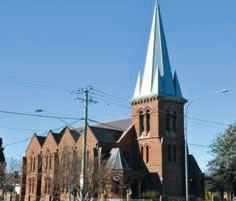
2012, when our long-term Minister retired, an interim ministry was established, and from that came the formation of a Community Engagement Team.
A committee was formed from volunteer members of the congregation who had not previously been very involved apart from worship, but who were eager to be part of something new. Around this time, St Vincent de Paul, who had operated a shelter for many years, lost their funding and closed their shelter—leaving a big hole in the local support network.
Through meetings, planning, prayer, and hope, the idea of a Drop-In Centre was born. On a wing and a prayer—and thanks to a generous donation from an anonymous member of the congregation—we began serving a hot cooked breakfast seven days a week. Showers were available, as were fresh clothes. Volunteers came from many sources: parents from my school, groups of high school students, members of other churches, and friends. It was amazing getting out of your nice warm bed— when the Goulburn temperature was -6°C—to provide for someone else.

This continued for eight years. It wasn’t always easy, but it was always filled with hope and determination to ensure every day was covered. Then COVID hit—at a time when help was needed more than ever—and restrictions meant we had to close. However, this season of community involvement had already cemented relationships with a wide range of people. The Greek Orthodox Church became one of our major financial benefactors.
WE ARE A SMALL, AGEING CONGREGATION BUT WE GET THINGS DONE!
The Friday Café has since blossomed and grown, attracting people from all walks of life—both to assist and to visit. It’s a space for meeting friends and finding companions in a non-threatening environment. Home-cooked treats, friendship, and acceptance abound.
While scripture is not taught in schools in many areas, Goulburn is the exception. Our church’s involvement—both physically and financially—keeps our name alive in the community.
Our Girls’ Brigade is blessed to have three vibrant, enthusiastic, and energetic leaders who inspire the girls with an amazing range of activities.
The Community Garden is thriving and continues to attract new, creative gardeners.
A group of dedicated people has formed a committee to welcome a refugee family to Goulburn. A broader community group is hopeful of resettling 10 Syrian families, and we are sponsoring one of them.
We are a small, ageing congregation— but we get things done!
I cannot help but feel: The power of the Lord is moving in this place
DOROTHY KEEGAN
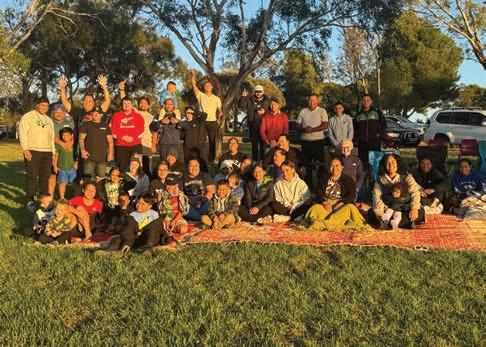

The Next Generation
EMBRACES GOD’S RADICAL HOSPITALITY AT GRUC
Griffith Regional Uniting Church (GRUC) is an intercultural gathering of God’s people within the Griffith/Riverina region which is a highly multi-cultured area.
The empowerment of young adult leaders in our life and witness has been very effective. From where the church was a year ago, it has grown quite dramatically. The Church Council is now also led by young people. This has been accredited to our young families and young leaders, with the support of the members, presbytery and Synod, for their leading the congregation to keep the doors open and further express their faith in Jesus through our ministry.
With their strong family and social connections, heartfelt devotion and prayer, and fresh energy and ideas,
EMBRACING
A MODEL THAT REFLECTS THE COLOURFUL TAPESTRY OF GOD’S CREATION WOVEN WITH THREADS OF LOVE AND HOSPITALITY
GRUC holds great potential—especially now, with a minister in placement to guide and support them further.
The church consists of four major cultural groups, predominantly from the Pacific Islands, with a few people from different cultural backgrounds. Since starting in my role 4 months ago, it has been mostly through our Sunday worship services where we sing, read, speak and pray in the various languages. Our leadership team is also an intercultural committee where we work to together reflecting the intercultural membership of our congregation.
One of the many success stories thus far is the young leaders working diligently for the ministry. With the influx of intergenerational and intercultural families becoming regular worshippers and members, and the arrival of seasonal workers in Griffith, the church community has been growing and evolving. Many are responding to the needs of both the church and the wider community, while also navigating the responsibilities of young parenthood and learning the ropes of church leadership. It’s amazing what they have achieved— with the Holy Spirit at their side. But this growth has also come with its challenges.
Like many churches today, the main challenge is resourcing whether it be
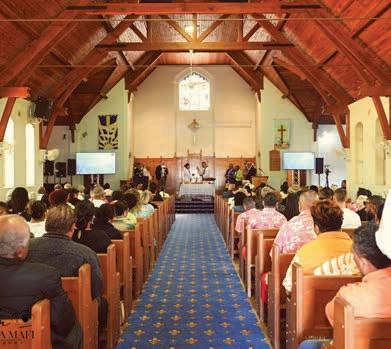
finances, manpower, or experience. Although our new young team have the support of experienced members from various committees, it often costs either financially or physically to get our ministry where it needs to be.
We continue to discern and develop a governance structure and ministry initiatives that reflect the will and way of God for our congregation and beyond. Through the different seasons of life, we lean on the leading of the Holy Spirit.
Our approach to ministry remains rooted in two core models:
Synod –with a focus on communion, participation and mission together as God’s people for all of God’s creation.
17th Assembly –by embracing a model that reflects the colourful tapestry of God’s creation—woven with threads of love and hospitality. Culturally and ecumenically, we aim to reflect God’s radical welcome, celebrating unity in diversity through worship and shared community.
REV. KEPUELI
VAKA MINISTER OF GRIFFITH REGIONAL UNITING CHURCH
City
Country MEETS
On Friday morning, 20 June 2025, seven women of the Uniting Church in Australia Concord Congregation loaded themselves into the UCA Concord bus and set off to Dubbo for the weekend.

We had been invited by the Dubbo Congregation and two members of Frontier Services, Rev. Noel Williams and Therese Clancy, who had arranged a program for us.
We were accommodated in a sevenbedroom home so there was us ample opportunity to share our life experiences, including over dinner on Friday night. A frosty walk along the Macquarie River (minus one degree Celsius) helped some of us develop a good appetite for breakfast.
Saturday morning was spent with the Dubbo Congregation’s ‘Saturday Sisters’ craft group. Some of us were involved in their charity blanket making activity, or knitting beanies, socks and other objects using loom knitting kits provided by Noel. We were also joined by Dubbo Congregation’s minister, Rev. Mel Graham – another great time of sharing. Rev Mel came to Dubbo from Sydney so had learned much about city and country differences and could tell us of her experiences. Therese and women from the Church provided us with morning tea and lunch. Therese’s orange cake, the hot soups and sandwiches all went down well. Saturday Sisters leave a charity blanket on the seat at the front of
the Church for homeless people – these are very popular in winter.
The afternoon was spent at the Royal Flying Doctor South Eastern Section Dubbo base, one of 21 such services in Australia. It services 7.69 million square kilometres of Australia including western New South Wales. While the Royal Flying Doctor Service and Frontier Services are separate now, both were started by Reverend John Flynn – often known as Flynn of the Inland. In the early 20th century, he pioneered medical services for the people of the inland, including the world's first aerial medical service, now known as the Royal Flying Doctor Service. It is too easy for those of us living in cities to overlook the extent and value of this work that has been ongoing now for over a century.
After dinner we returned to our house where we were honoured to hear from Noel and Therese about their work.
Rev. Noel Williams is a bush chaplain who works in the Barwon Remote area out of his home at Narrabri. He services most of western NSW, travelling some 4,500 to 5,000 kilometres a month. He now has a caravan so he can take his home with him. An ordained minister, he previously spent 40 years working as a
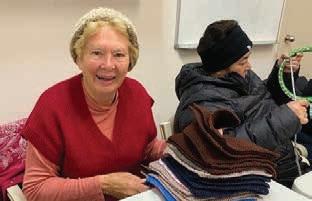
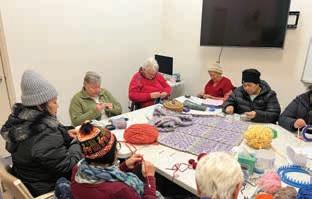

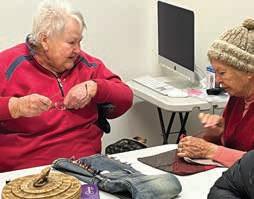
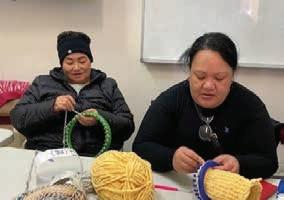

Chaplain in the Royal Australian Air Force. Noel does a lot of listening, providing pastoral care to remote area farming families and addressing many issues that are the result of isolation. There are very few churches in western NSW with ordained ministers. Between our 22 Bush Chaplains and volunteers they covered 1,084,980 kilometers to the most isolated parts of the country.
Therese Clancy is based in Dubbo and is a Volunteer Programs Coordinator for Frontier Services. She is one of four Volunteer Program Coordinators working across the remote areas from central QLD to southwest VIC. Frontier Services has a list of some 286 volunteers who have many and varied skills. Throughout the 2023/24 Financial Year, Frontier Services was proud to support 23,327 people with 190 volunteer placements nationally which equates to 9,127 hours of volunteer work (equivalent to $394,924 in support costs).
Therese seeks to utilise the skills of the volunteers to address the many calls for help she receives from property owners, small towns, and organisations of various kinds. There might be a flood damaged home; Country Women’s Association (CWA) rooms to paint, clean
and tidy; a farmer needing fences repaired; machinery broken down; the list is endless. Therese assesses the job, contacts appropriate volunteers, organises the materials, arranges accommodation for volunteers, and so on. No small task! But there are many success stories.
As is the case with the Royal Flying Doctor Service, it is very easy for those of us living within relatively easy reach of services to overlook the challenges of life ‘in the bush.’ We were all heartened to hear of the selfless work being undertaken by people such as Noel and Therese, and challenged to keep their work in mind, offering support where we can.
On Sunday morning, we worshipped with the people of Dubbo Congregation. There was a baptism and a celebration of the 48th birthday of the Uniting Church in Australia. We seven, with support from Noel on guitar, sang during the offering. After the cutting of the church birthday cake, we gave our sincere thanks for wonderful hospitality and fellowship, made our farewells, and drove back to Sydney.
This little excursion itself has its own back story. In 2016 Concord
Congregation was blessed to be approached by a Tongan background group seeking a new place of worship. Our then minister, Rev Nau A’Hosivi, invited them to become part of us. We needed ways of getting to know each other better and as a part of doing so formed a women’s group aptly named Winning Women. Winning Women meet monthly for social and charity activities.
Having made Concord her family’s home church, our Moderator, Rev. Faaimata Havea Hiliau, herself joined Winning Women and it was her suggestion to make a connection to a country congregation. We sought assistance from Rob Floyd, National Director of Frontier Services, when he came to take a service at our church last year. Rob made the link for us and asked Therese and Noel to make the arrangements. A big thank you to them all.
ADA MACKAY
UNITING CHURCH
CONCORD CONGREGATION
WESLEY MISSION WIC RYDE
FINDS PERMANENT HOME AFTER YEARS OF TRANSITION

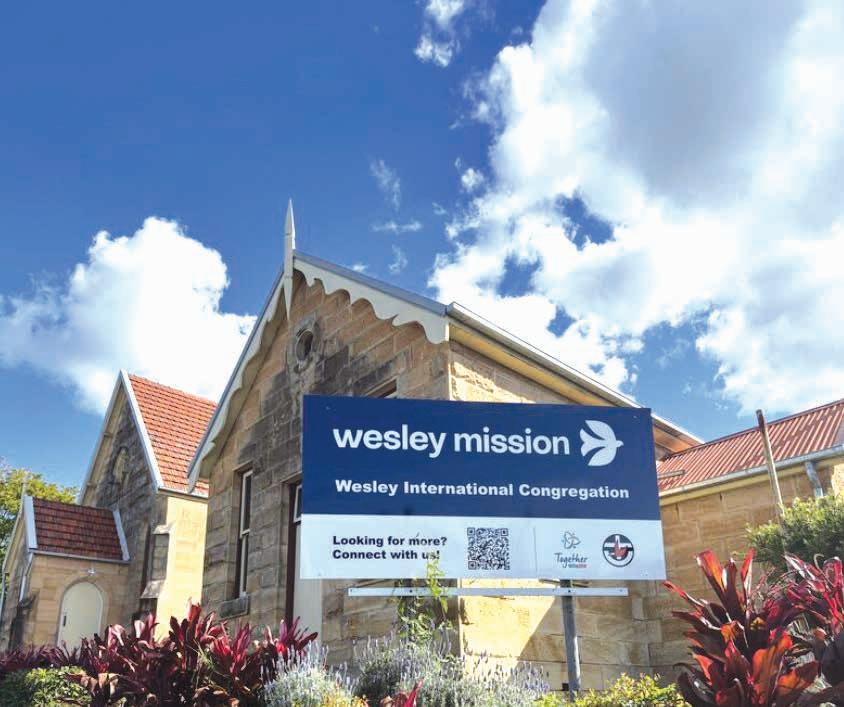
After more than a decade of worshipping in various temporary venues, the Wesley Mission International Congregation (WIC) Ryde congregation has finally found a permanent spiritual home.
The vibrant, multi-generational community of over 250 people has now settled into the former Top Ryde Uniting Church building, marking a significant new chapter in its ministry.
For the past three years, the congregation had been graciously hosted by Excelsia College, where weekly services and ministries continued to grow. But the recent move into a dedicated facility means much more than logistical ease — it allows for ministry seven days a week, deepening Wesley Mission’s commitment to serving the local Ryde community.
“No more setting up and packing down each Sunday,” said Rev Stu Cameron, CEO and Superintendent of Wesley Mission. “Now the congregation have a place where the work of Jesus Christ —
in both Word and deed — can take place every day of the week.”
Rev. Cameron expressed deep gratitude for the patience and resilience shown by the WIC Ryde leadership throughout the years of transition. He also acknowledged the vital partnership with the Sydney Central Coast Presbytery (SCCP) which helped make the permanent relocation possible.
“For the Sydney Central Coast Presbytery the old Wesley Church in Top Ryde had become a challenge with heritage listings and more. We were able to work with Wesley Mission to bring about internal renewal which have made the church warm and inviting and very multifunctional,” said the Rev Nich Cole from SCCP, who went to the WIC Opening Service. “The passage of the dry bones
coming back to life in Ezekiel 37 has many parallels for this church site. What many thought would be a struggle to have vibrant worship again is now filled with songs of praise and joy.”
“This is an incredible example of God’s provision,” he said. “We’re thankful not only for the building, but for the opportunity it gives us to continue loving and serving the people of Ryde in practical, life-giving ways.”
The new facility enables Wesley Mission to expand its community outreach, discipleship programs, and worship gatherings, all grounded in its longstanding mission to "do all the good we can" — a mission now rooted permanently in the heart of Ryde.
ADRIAN DRAYTON
UNITING CHURCH ADULT FELLOWSHIP (UCAF)
Fellowship News
Spring is a time of new growth and some warmer weather. Many begin their spring cleaning and get busy in the garden with new plants to bring colour and joy. We too begin new changes in our Synod as we move forward to new directions and challenges.
IN MEMORY: JOAN STOTT
We recently learned sad news of the death of Joan Stott. Joan was a former nurse and later in life completed a Clinical Pastoral Education program. She used this knowledge to train volunteers for a visitors’ program, and many went on to regularly visit aged care facilities. Working with older members of congregations led her to being involved in UCAF leadership. She became National President of UCAF in 1985 and became involved with World Federation of Methodist Women and in the Asia Pacific Region attending conferences and becoming editor of their newsletter, “Tree of Life”. As the organisation became World Federation of Methodist and Uniting Churchwomen, she became their secretary. Her ministry between 1991–2001 involved many World and Non-Government Organisations and afterwards she continued to include Lay Preaching and writing. She remained deeply committed to UCAF in Victoria and Tasmania doing lots of travelling.
The previous National Committee established the “Joan Stott Bursary” to honour the commitment of Joan to education across the church. This bursary has been awarded yearly by the National Committee but now is administered by the Assembly. Many have received it enabling them to pursue their theology studies and youth work studies.
HUNTER PRESBYTERY UCAF COMMITTEE UPDATES
The Hunter Presbytery UCAF Committee recently held its AGM and meeting. We’re pleased to announce the following:
• Gary Robson remains Chairperson.
• Dawn Robson is the new Secretary/Treasurer, following the retirement of Philip Wrightson.
Philip was presented with a Certificate of Appreciation and voucher in recognition of his dedicated years of service. We sincerely thank him for his service.
UPCOMING EVENTS
Retired Ministry Persons Lunch held at Toronto Uniting Church in September
Hunter Presbytery Gathering held at Morpeth Uniting Church on Wednesday, 23 October with special guest Rob Floyd from Frontier Services
We thank both of these congregations for their willingness to hold these events.
The Retired Ministry Persons lunch will be held at Toronto UC in September, and the Hunter Presbytery Gathering will now be held on 23rd of October at Morpeth UC. Rob Floyd from Frontier Services will be the Special guest. We thank both of these congregations for their willingness to hold these events.
UNITING CHURCH ADULT FELLOWSHIP (UCAF) SALES AND STAMP COLLECTIONS
The Committee was grateful to Margaret Gregory for transporting sales items for the Riverina to Synod for collection. Secretary Laraine is happy to provide lists and information on what is available.
The Stamp Committee welcomes visitors to its rooms on Tuesday mornings 9am–12 noon at Level 2, Pilgrim House, 262 Pitt Street, Sydney.
Please continue to collect stamps, stamp albums and collections as they provide the income for grants each year to congregations for their projects. They can be passed on to UCAF committee members.
APPRECIATION CERTIFICATES
We continue to honour members aged 80, 90, and 100+ who have made meaningful contributions to church life. These certificates are deeply appreciated by recipients and their families.
Recently, Kaye Payten, former Synod Committee member, received hers as she celebrated her 90th birthday.
To request a certificate for someone in your congregation, please contact Secretary Laraine.

If you would like to share your fellowship news or have any questions, please contact Judy Hicks: judyh_rnh@hotmail.com
SYNOD 2025
TRANSFORMING COMMUNITIES
From July 11–13, more than 340 members of the Uniting Church in NSW and the ACT gathered at the Western Sydney Conference Centre, which stands and operates on the land of the Mulgoa clan of the Dharug Nation, for what was one of the most significant Synod meetings in recent history.
At the heart of Synod 2025 was a landmark proposal that asked members to consider a major structural change: dissolving the current 12 Presbyteries and creating three new ones, to be known as the Northern, Central, and Southern Presbyteries.
Known as the “3P Model,” this recommendation was the result of 18 months of careful consultation, summit gatherings, and discernment.
This proposal was passed by agreement and is the most substantial shift in the Synod’s governance in decades. It reshapes how the Church supports its' congregations, allocates resources, and strengthens its leadership and mission.
Now the work begins, as a Transition Commission will be tasked with bringing this bold vision to life.
This was a pivotal moment in the Synod's life and mission that has been made with prayer, courage, clarity, and deep listening—to the Spirit, to one another, and to the call of Christ in a changing world.
REPORTING: SYNOD COMMUNICATIONS TEAM
PHOTOGRAPHY: ALYSSA LEE
DAY 1 DAY 2
P18
Synod 2025 Appoints Rev. Dr Peter Walker as general secretary
P20
Resourcing Future Directions: Bold projects, shared hope
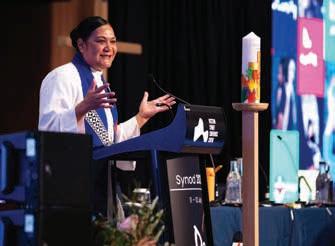
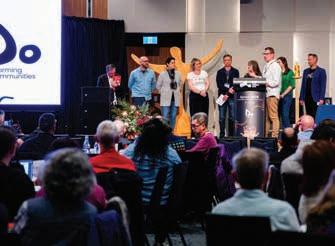

P22
Rev. Pablo Nunez Brings Grounded Faith and Vision as Moderator Elect
P24
Wrestling with the Nicene Creed in 2025
P25
DRCN: A Vital, Responsive, and Compassionate Ministry
P26
Uniting Mission and Education Celebrating Growth and New Beginnings
P28
A Faithful Disciple at the Heart of Change: Honouring Rev. Jane Fry’s Quiet, Steady Leadership
P29
Reshaping Presbyteries for a Stronger Future
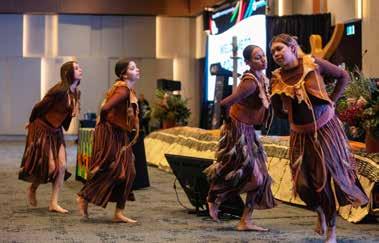
Transforming Communities

3

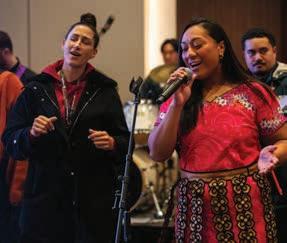
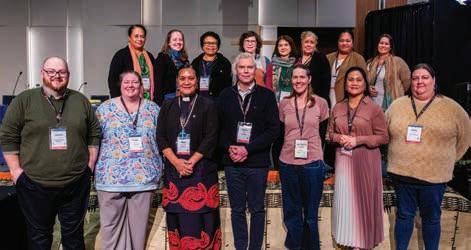
Proposal for Ministry and Placements Review Group Passed by Synod Members
Renewed Hope and Growth for UAICC
Uniting Church Schools: Deepening Faith Identity
Appointments to Standing Committee and ACOMP

SYNOD 2025 APPOINTS REV. DR PETER WALKER AS GENERAL SECRETARY
Rev. Dr. Peter Walker has been appointed as General Secretary at Synod 2025.
Rev. Walker expressed his deep gratitude over the appointment as he was joined on stage by his wife, Sarah, and mother, Elizabeth.
“I am humbled by your confidence in me, and I promise never to take that confidence lightly,” said Rev. Dr Peter Walker after applause from the Synod floor. “The General Secretary is a servant of this council of the Uniting Church, and together we are servants of Jesus Christ. Thank you for your willingness to work together with me in this next part of my ministry.”
“In setting out to do this I am thankful for the General Secretary’s that have come before us. In my memory that spans from Norman McDonald to Jane Fry –they have set an extraordinary example for us,” Rev. Dr. Walker said.
Rev. Walker highlighted the critical role relationships play in the life of the Church.
“We are an interconcilliar church and relationships are everything to us. Relationships are not made with regulations or by-laws, they are the invisible glue that is holding us together. Through relationships we can build trust and through trust we can build faithful change. The software of relationships calls for as much attention at least as the hardware of structures,” Rev. Dr. Walker said.
“We are not only an interconcilliar church we are also an upside-down church, we are a church where hierarchies are upended and so it’s a mistake to believe that one part of the Uniting Church is more important than the other. Local Uniting Churches and congregations are
the heart of the Uniting Church,” Rev. Dr. Walker said.
The process to appoint the General Secretary of the Uniting Church Synod of NSW and ACT was carefully structured to balance openness, discernment, and confidentiality. A report prepared for Synod 2025 outlined the nomination process and the steps the Synod in Session took to finalise this important appointment.
Earlier this year, the Synod Standing Committee established the General Secretary Nominations Committee (GSNC) to oversee the search and discernment process.
The committee was convened by Heather Watson and includes Rev. Simon Lee, Rev. Simon Hansford, Rev. Elenie Poulos, Denise Wood, and
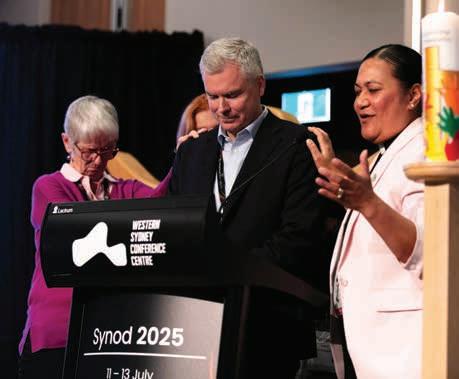
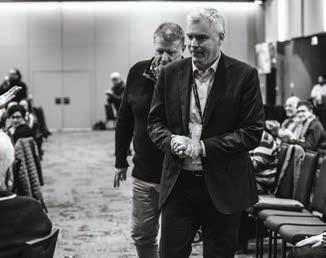
Rev. Dr Adam McIntosh (General Secretary, Queensland Synod).
Their task was to identify and recommend a candidate who can lead the Synod’s work with integrity and vision.
To maintain the integrity of the process and to support the nominated candidate, the GSNC’s discussions and the candidate’s identity have remained confidential throughout, shared only directly with the Synod in Session rather than with the broader Synod Standing Committee.

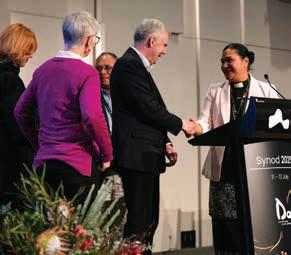

"I AM HUMBLED BY YOUR CONFIDENCE IN ME, AND I PROMISE NEVER TO TAKE THAT CONFIDENCE LIGHTLY"
REV. DR PETER WALKER
This carefully designed process reflects the Synod’s commitment to transparency, discernment, and shared responsibility in appointing a leader who will guide its mission and ministry in the years ahead.
“I promise to remember every day that we are an upside-down church and promise each day to ask how the Synod is helping our local churches and our local ministry leaders,” Rev. Dr. Walker said.
Rev. Dr Peter Walker will commence as General Secretary in October.
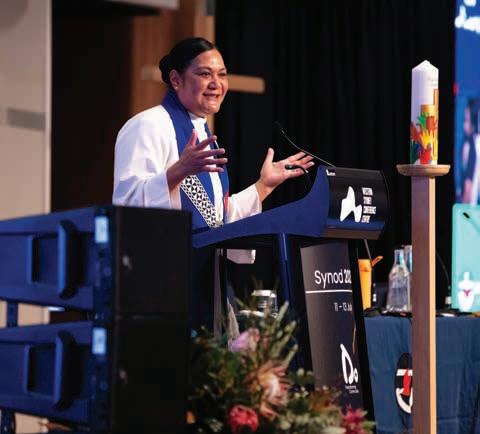

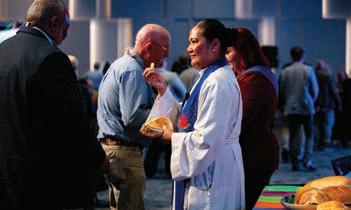
REV. FAAIMATA HAVEA HILIAU CALLS SYNOD 2025 TO BOLDLY TRANSFORM OUR COMMUNITIES
At the 2025 Synod meeting, Rev. Faaimata Havea Hiliau invited members of the Uniting Church in NSW and the ACT to look outward and embrace the theme of “Transforming Communities.”
Building on the previous Synod’s focus on the “Transforming Spirit,” Rev. Hiliau spoke about how faith is meant to shape shared life and become a gift to the world. Drawing on the biblical story of the loaves and fishes, she reflected that transformation often begins in small acts of generosity, which God can turn into something far greater.
Rev. Hiliau highlighted how transformation grows when individuals and communities bring what they have - whether it’s students across Sydney striking for climate justice, or diverse faith communities coming together to mark Ramadan. She shared stories from across the Synod: from youth at PULSE camps openly sharing their perspectives, to congregations reimagining worship
outside traditional church buildings, in community halls, kitchens, and verandahs.
Her experiences as Moderator, from standing alongside world leaders as a daughter of the Pacific advocating for creation care, to witnessing quiet moments of kindness in flood-affected regions, underscored the many ways transformation takes root. Rev. Hiliau described how even a small act, like a conversation with a security guard worried about supporting his family after Cyclone Alfred, can carry seeds of hope.
The Moderator also reflected on her most recent trip to Tonga for the Free Wesleyan Conference where she literally felt the effects of climate change as
she commuted to the venue each day through precarious flood waters.
Turning to the Presbytery Project led by Rev. Dr Robert McFarlane, she acknowledged its bold proposal to dissolve and reshape presbytery structures. Rev. Hiliau encouraged Synod to see this not merely as an administrative change, but as a spiritual invitation to live and lead with collaboration, courage, and trust in the Spirit.
Quoting the example of Joshua, she reminded the gathering that faith means stepping forward without knowing every detail, trusting the God who calls and equips.
RESOURCING FUTURE DIRECTIONS: BOLD PROJECTS, SHARED HOPE


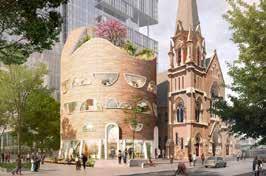


At Synod, Luke Doo Hwan Lee (Treasury & Investment Services) and Jim Katehos (Property Program Delivery) outlined major projects that bring the Uniting Church’s Future Directions vision to life through property, partnerships, and mission.
“We are a Pilgrim People, not a Pilgrim person,” said Lee, highlighting the shared journey now seen in three key developments:
BURWOOD: THE SPIRE
Led by Burwood-Croydon Uniting Church, this 49-level precinct will include affordable housing, an early learning centre, community spaces, and a renewed church. It ensures long-term income to support local and Synod-wide ministry.
PARRAMATTA: INSPIRE
Centred on historic Leigh Memorial Church, this project adds new community and residential spaces—supporting essential workers and survivors of domestic violence—while generating income and delivering facilities debt-free.
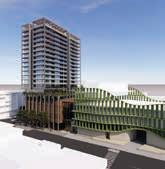
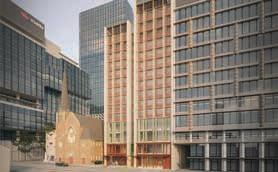
COFFS HARBOUR: PROJECT ECCLESIA
Plans include a new ministry centre with worship space, soup kitchen, offices, retail, and affordable housing. Developed in partnership with Wesley and Uniting, it reflects years of local vision and supports ongoing mission.
LOOKING AHEAD
These projects are more than buildingsthey are faithful, future-focused steps to resource worship, witness, and service for generations to come.
Fellowship Centre | Parramatta
Epworth House | Parramatta
Project Ecclesia | Coffs Harbour

REV. PABLO NUNEZ BRINGS GROUNDED FAITH AND VISION AS
MODERATOR ELECT
Rev. Pablo Nunez steps into the role of Moderator Elect, bringing years of grounded and diverse ministry across rural, regional and urban Australia.
Rev. Nunez began his acceptance speech by honouring his South American roots and connection to the Charruas on the east coast of the Uruguay River. He expressed his deep gratitude for being nominated to the role and recognised the strength of his fellow candidates.
“Thank you from the bottom of my heart. Thank you for your trust, your prayers, your stubborn hope in the gospel, and for daring to dream with me about what our church can become. Thank you very much to the other nominees for what a great sign of the quality of people and leadership we have in our Church.”
“I stand here only because of those who have gone before me, so I honour the faithful generations that built and kept the traditions that form us alive and have been holding on to faith and hope so we can stand here today. Thank you to the past Moderators, mentors, Elders, ministers, lay leaders, congregational
kitchen saints, youth groups, van drivers, the accidental theologians in our church councils, and to every choir member that either writes a note, even if it was just on the third try, thank you very much for being the church,” Rev. Nunez said.
"I’m particularly thankful for the immigrant communities, like my own, who brought fire, faith, and food to the table. We might have come with accents and empanadas, but we also brought a deep love for Jesus and a radical belief that the church can still change lives. To every member, from every culture, from every generation, thank you for making the Uniting Church a unique expression of the body of Christ."
The Moderator Elect’s ministry has been diverse including positions in regional and rural area where he witnessed the resilience of faith communities grappling with ageing demographics, climate challenges, and changing social contexts.
Through his ministry he also saw the extraordinary creativity of rural congregations living out the Gospel in kitchens, op shops, paddocks and local festivals. Rev. Nunez served most recently as Minister at Ballina Church, where he walked alongside a vibrant, intergenerational and increasingly intercultural community.
“I’ve learned what it means to hold grief and celebration together — through bushfires, floods, pandemic, and beyond — and to preach the Gospel with both tenderness and prophetic fire,” Rev. Nunez said.
Rev. Nunez recognised that this was a pivotal time in the history of the Church.
“This is a vital time in the life of the Church. The fears are climbing in some places. The questions are getting deeper. And the world out there often thinks that we have lost our relevance. But let me

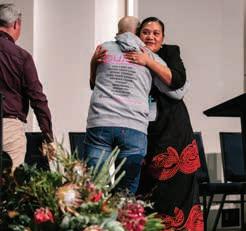

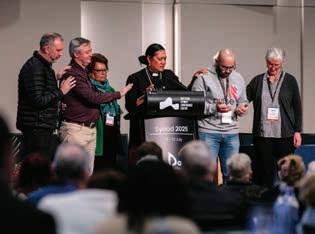
repeat something that I said yesterday. God is not finished with us yet.”
“We have been entrusted with a gospel that still raises the dead, still heals the broken, still builds communities of grace in unexpected places, with unexpected people. The Synod has chosen transforming communities as its theme, and I believe that's not a slogan. It's a call to action. Not to build empires or fix everything with a community report, but to be out there on the margins, in the mess, and in the mystery,”
“I see a church that is intercultural, intergenerational, and courageous. A church that isn't afraid of the hard questions. A church that believes in the children's voices, in First Peoples'
leadership, in migrants dreaming of others, on local mission that smells like sausages and inclusion. A church that can hold lament and laughter in the same liturgy. We are not going back to the church of the 1950s, and praise the Lord for that.”
"So, with a bit trembling knees and a full heart, I accept this call. Not because I have all the answers. But because I believe in the Jesus who walks on water and also sits by the fire with the brokenhearted. I accept it because I trust the Spirit who speaks in many languages, and sometimes even through Synod resolutions. I accept it because I love this church—imperfect, beautiful, brave, and blessed."
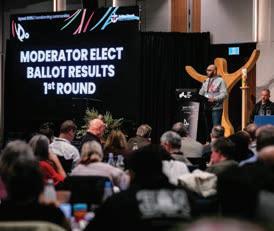
"So may the road ahead be paved with grace. May we be bold in our love, stubborn in our hope, and ridiculous in our generosity. And may God, who is always doing a new thing, find us willing— sometimes even eager—to follow."
“We are the Uniting Church. We were born in hope, not in certainty. We were raised on mission, not on institution. We are built on covenant, not on comfort. Friends, we are not done yet,” Rev. Nunez said.
Rev. Nunez will be installed as Moderator in 2027.
WRESTLING WITH THE NICENE CREED IN 2025
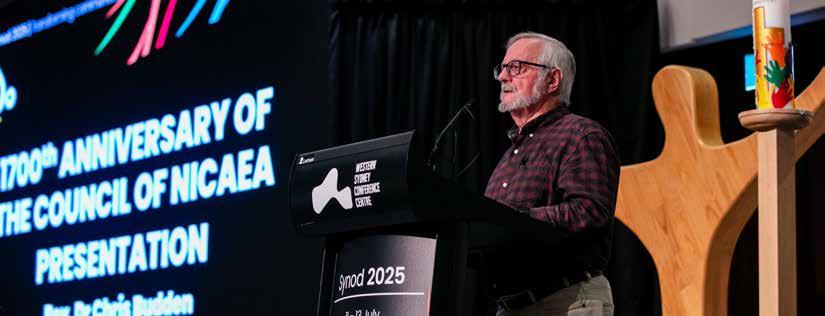
At Synod 2025, Rev. Dr Chris Budden invited members to look again at the Nicene Creed — a core statement of faith shared by many Christians for nearly 1700 years. But instead of simply defending it, he asked hard questions about what it really says, what it leaves out, and what it has meant for the Church’s life in the world.
Chris started by asking why the Nicene Creed matters at all. He said it isn’t just about getting doctrine right. It shapes how we see God, the world, and each other. That “architecture of faith” then shapes how Christians live.
He gave some history. In 325CE, church bishops met at Nicaea, supported by Emperor Constantine, to settle an argument about Jesus. Was Jesus truly God, or something less? The Council sided with the view that Jesus really is God. But Chris noted this wasn’t just a debate about theology. It was also about power and about making faith reasonable in the eyes of the empire and educated society.
THE CREED GIVES CHRISTIANS A SHARED LANGUAGE ABOUT GOD
power. The bishops’ authority grew. The Church became more orderly and less open to messy, diverse voices. Over time, God came to be imagined less as the self-giving, suffering God seen in Jesus, and more as a distant, controlling sovereign. That view, he argued, helped support systems of domination: colonisation, slavery, and male control in church and family.
But Chris also reminded Synod that the Creed is not all bad. It gives Christians a shared language about God — especially about Jesus being truly God, and about the triune life of God as Father, Son and Spirit. At its best, it reminds us God is relational, not a lone ruler.
• How do we balance being part of an institution with leaving space for Spiritled voices?
Chris also raised the importance of teaching about the Trinity and incarnation, not just as old doctrine, but as truths that shape how we live and what we value.
He ended by reflecting on a line he’d read: the bishops at Nicaea “met under the protection of the Empire.” That protection shaped what was said and what wasn’t. In Australia today, he asked, how might our faith also risk being shaped by the desire to fit in, to keep power, or to stay comfortable?
This led Chris to ask whose questions we answer today. Are we still shaping disciples, or mostly trying to show that faith makes sense in modern terms? And whose voices shape our faith — is it still mainly official church leaders and institutions, or do we listen to the ordinary, faithful people and their experience of God?
Chris talked about what happened when the Church became closer to imperial
Still, there’s work to do. The Creed doesn’t mention Jesus’ teachings, his challenge to empire, or the call to radical discipleship. Chris said we should ask what else needs to be said today — in our place and time — so faith speaks more fully about God’s care, justice, and love.
He encouraged Synod to see receiving the Creed not as passive acceptance but as active work. This means asking:
• What kind of God do we reflect in our life together?
• Does our faith defend the powerful, or does it question them?
Chris’s hope was that the Nicene Creed can become again not just a statement to recite, but something that deepens worship, discipleship, and justice.
And he left Synod with these questions: What challenged or puzzled you? What would you add to the Creed, or say differently, so it speaks more clearly to life and faith in Australia today?
DRCN: A VITAL, RESPONSIVE, AND COMPASSIONATE MINISTRY
The Disaster Recovery Chaplaincy Network (DRCN) presented its 2025 Synod report, highlighting a year of compassionate service, leadership transition, and new initiatives.
Established in 2009, the DRCN provides emotional and spiritual support during disasters across NSW and the ACT. With over 400 trained chaplains from 15 faith traditions, it is a key outreach of the Uniting Church.
Rev. Dr Stephen Robinson, who led the network for 15 years, has moved into a full-time national role. A new leadership team was introduced:
• Rev. Dr Mark Layson – Director and Senior Chaplain
• Rev. Mark Muss – Projects and Support Manager
• Ms. Sharon Clark – Operations and Training Manager
• Mrs. Dawn Beeson – Administrator
The network is guided by the Disaster Recovery Oversight Committee (DROC), chaired by the Moderator, with Rev. Robinson as convener. The committee oversees policies, recovery strategies, and disaster-related funds.
KEY DEPLOYMENTS (2024–25)
Volunteer chaplains contributed over 5,500 hours in response to:
• Ongoing flood recovery in the Central West
• Repatriation support for Lebanese Australians
• Parramatta unit fire (Chinesespeaking chaplaincy)
• Cyclone Alfred and Mid North Coast storms
• Bondi Junction mass casualty anniversary service
COMMUNITY RECOVERY PROJECTS
The DRCN expanded into long-term support through:
• Business chaplaincy in Lismore
• Community care in Narooma and Central West
• Pastoral support in temporary accommodation
THIS YEAR ALONE, OUR CHAPLAINS HAVE SERVED NEARLY 4,000 HOURS—EQUIVALENT TO 4 YEARS AND 8 MONTHS OF FULLTIME WORK
THE SHEPHERD PROJECT
Launched in 2025, this initiative supports faith leaders responding to violence at places of worship, with resources to be rolled out across all faith communities by year’s end.
Rev. Layson shared, “This year alone, our chaplains have served nearly 4,000 hours—equivalent to 4 years and 8 months of full-time work.”
Rev. Robinson concluded: “The DRCN is a unique and generous gift from the Uniting Church to the state, the nation, and beyond. It’s something only we could do—bringing together diverse faiths to serve in times of crisis.”
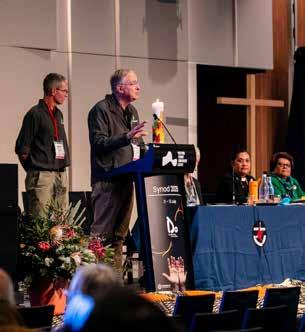
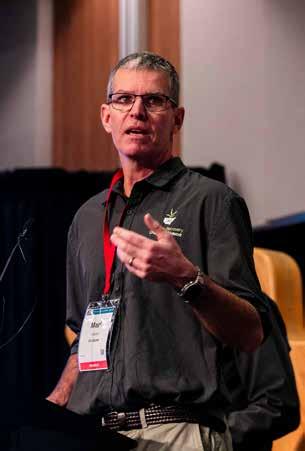
UNITING MISSION AND EDUCATION CELEBRATING GROWTH AND NEW BEGINNINGS
At this year’s Synod meeting, the Uniting Mission and Education (UME) team provided a powerful update on two key initiatives shaping the future of the Uniting Church in NSW and the ACT: the Synod Growth Fund and the Church Planting Initiative.
At the Synod’s Day 2 afternoon session, the Uniting Mission and Education (UME) team shared updates on two key initiatives: the Synod Growth Fund and the Church Planting Initiative — both aimed at nurturing vibrant, inclusive communities that reflect Christ’s hope and grace.
SYNOD GROWTH FUND
Director of Mission Glen Spenser highlighted the Growth Fund’s impact through stories featured in the Synod magazine. The Fund supports grassroots ministry where discipleship and community take shape.
“These are your seeds of growth,” Spenser said. “The funding is going exactly where ministry and mission happen — in real life, with all its pain and beauty.”
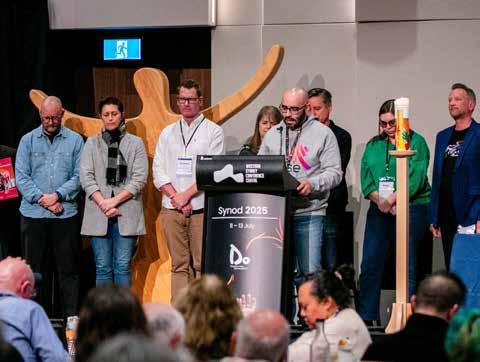
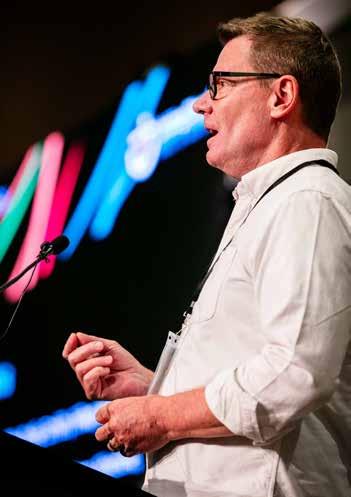
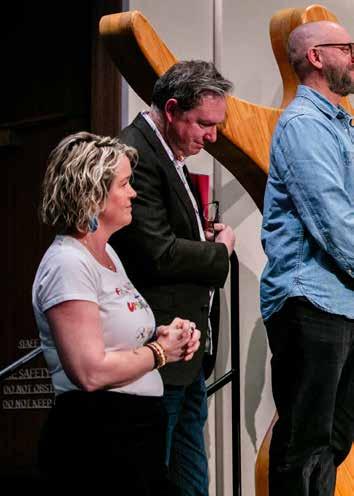
CHURCH PLANTING INITIATIVE
Since the 2023 Synod decision to prioritise church planting, three new communities have launched in Molonglo Valley (ACT), Maitland (NSW), and Sutherland Shire (NSW).
Molonglo Valley: Andrew Smith shared how “holy loitering” — simply being present in public spaces — led to meaningful relationships and weekly Bible studies.
Maitland: Kevin Krause and Dr Pearl Nunn emphasised the area’s potential, engaging with a young, growing, and diverse population. “We’re creating spaces of inclusion where none existed before,” said Nunn.
Sutherland Shire: Mike Hardy and creative pastor Tash Holmes are building a community for those who’ve felt excluded from church, focusing on spiritual formation and healing. “It’s a fresh start for many,” Hardy said.

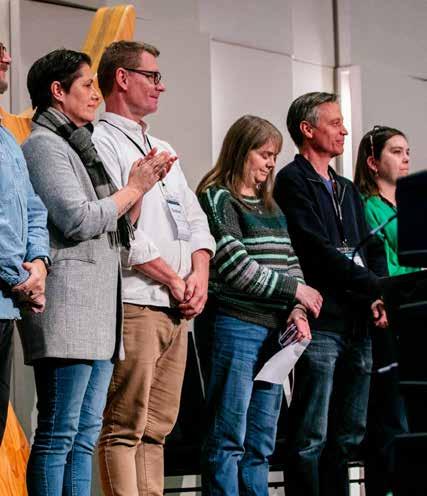
LOOKING AHEAD
UME announced a cohort of six church plants will receive ongoing support and spiritual care, including new efforts in Western, North Western, and South Western Sydney. “This is just the beginning,” said Graham Hill. “We hope to see many more new churches rise over the next decade, each reflecting the best of the Uniting Church in today’s world.”

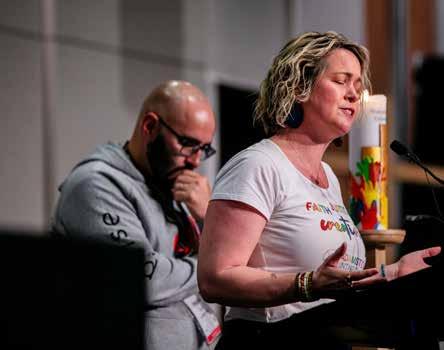
A FAITHFUL DISCIPLE AT THE HEART OF CHANGE: HONOURING REV. JANE FRY’S QUIET, STEADY LEADERSHIP
This is a transcript from the Minute of Appreciation delivered at Synod 2025 for Rev Jane Fry presented by Rev. Bronwyn Murphy and Former Moderator Rev. Simon Hansford.
The Lord be with you!
Bron and I approach this moment with some trepidation, being fully aware of how little Jane enjoys the glare of limelight. She is quite content to remain largely unremarked, so we face this task of edging Jane gently to centre stage and, for a brief minute, celebrating her gift to the Church.
This is the deeply critical part of our task: Jane’s understanding of ministry means that her placement and gifts are held, valued and celebrated only in the context of the church she loves and has served, as a faithful disciple.
Jane was a surprise gift to our faith tradition from the Anglican church. Discerning a persistent and hopeful call to ministry, her then Bishop advised her to grow beyond the limitations of a denomination that only valued one gender in the role of ordained leadership. This same bishop offered prayers for Jane each day in the years which followed her decision.
A period of attending UTC, as private student, and then as Candidate for Ordination, was a formation, both informal and formal, which led to her ordination on 28th November 1995.
Jane placement as General Secretary was preceded by Congregation and Presbytery placements, gaining leadership skills to accompany her ministry with word and sacrament. Jane eventually served in a placement as Associate Secretary of the Synod, and then Interim General Secretary before formally taking on the role of General Secretary in October 2017.
For those who remember, Jane accepted the placement because the Church called, and not because she knocked on the door.
We should never accept the call of God lightly, or with lack of due care and attention. Jane has never been accused of that. The rigour and responsibility of the role of General Secretary was accepted at the very beginning, and she has grown deeper into the role, as her wisdom and understanding similarly deepened.
Jane has not only “managed” the diverse and challenging “business” of our Synod, she has also provided vision, encouragement and strategic direction for the Synod to adapt to the changing times. One of the tasks of Synod leadership is to hold the treasure of the Church in one hand, seeking to preserve the gifts and graces which need honour and care; in the other hand, we hold those things which have served their time, hinder the church, and need to be laid to rest. This calls for discernment and courage, not the glib lines of planning and structure, but an understanding of what it means to be a people who are being continually renewed by the Spirit of the risen, crucified One.
Bonhoeffer stated the “The Church is the Church only when it exists for others”, and that has been at the forefront of how Jane imagined her role and calling as General Secretary.
Jane, Simon and I sat in George’s Café in Pitt Street, during the first signs we might be emerging from COVID. We were the only customers, the only people within in range, apart from the owner, who served our coffees. We talked with him about debt, and the future and what he was going to do to survive in his business; it was a challenging pastoral conversation.
As the Synod found its way through Covid, Jane’s guidance and the role of the Synod Leadership Team were critical in navigating waters of which we were entirely unsure, and for which there were very few reliable maps.
The Synod Office has needed to undergo significant change – structurally and culturally - as the community around us speaks of risk and compliance, and we acknowledge the human, social and financial costs of being less attentive in the past. Jane has worked constantly, encouraging the Synod Office to see itself as serving the Synod, and the Synod Office has largely responded well to that hopeful challenge.
I don’t know exactly what a prayer is. I do know how to pay attention, how to fall down into the grass, how to kneel down in the grass, how to be idle and blessed, how to stroll through the fields, which is what I have been doing all day.
Tell me, what else should I have done? Doesn’t everything die at last, and too soon?
Tell me, what is it you plan to do with your one wild and precious life?
THE SUMMER DAY, BY MARY OLIVER
Jane has been heard to remark that she doesn’t understand how people in ministry survive without prayer. We are thankful for Jane’s disciplined and faithful prayer and devotional life, offering her the strength and the grounding needed for a vocation not easily served.
Jane preaches with wisdom and mercy, arising from her prayer, her faithful attention to scripture, her ministry and the context in which she serves.
We have grieved together, as we shared the experience of watching the burden of ministry and discipleship take its toll on colleagues, not just in the Uniting Church. “Faith for some ministers is a dimly burning wick” has been an image that preoccupies Jane, conscious that
this season in which we serve is rigorous, indeed.
One of our greatest challenges is before us at the Synod in Session, as we consider and imagine how the shape of our Church might most effectively serve the world for which Christ died. Jane has shepherded the process, and also left it to the presbytery leadership when needed; this requires the wisdom to know when to speak, and when to keep silent.
“The Church of the future isn’t coming out of my head” is something Jane would often say. It is the role of the Church’s councils to discern our own vocation and the shape it takes. Let us listen to those often silenced, or who have been told to wait their turn.
Jane has always seen herself first as a disciple of the crucified and risen Christ, then as a servant of the Church. In this season of change before, and all around us, Jane has worked to engage and enable the Church as a body for active mission and not of the self-interest which so easily infests and infects our debates and vision.
Both of us give thanks for Jane’s wise and generous friendship; for the ease with which she laughs, as we share stories of our families and friends. Jane’s extroversion has often exhausted the two of us; we just wanted a quiet lunch on our Office and Jane was pestering us to go partying…
A handy hint for those who are unaware: if you who wish to experience Jane’s slightly sterner visage, ask her to stand for a photograph…
We give thanks for the merciful gift and wisdom of that Anglican bishop all those years ago, for the faithful discipleship of Rev. Jane Fry, and for the creative grace of God which placed Jane in the role of General Secretary of our Synod.
A poem, by R.S Thomas which we hope is apt:

I see them working in old rectories
By the sun’s light, by candlelight, Venerable folk, their black cloth
A little dusty, a little green
With holy mildew. And yet their skulls, Ripening over so many prayers, Toppled into the same grave
With oafs and yokels. They left no books,
Memorial to their lonely thought
In grey parishes; rather they wrote On men’s hearts and in the minds
Of young children sublime words Too soon forgotten. God in his time Or out of time will correct this.
THE COUNTRY CLERGY ’ BY RS THOMAS,
‘The Lord be with you.
REV. BRONWYN MURPHY & REV. SIMON HANSFORD | JULY 2025
JANE HAS ALWAYS SEEN HERSELF FIRST AS A DISCIPLE OF THE CRUCIFIED AND RISEN CHRIST, THEN AS A SERVANT OF THE CHURCH

RESHAPING PRESBYTERIES FOR A STRONGER FUTURE
A landmark proposal was passed by agreement on Day 3 of Synod 2025 to reshape the life and structure of the Uniting Church in NSW and ACT.
The proposal recommended dissolving the current 12 Presbyteries and forming three new regional Presbyteries: Northern, Central, and Southern.

All three proposals in the Presbytery Project were passed after extensive deliberation and discernment by agreement.
Rev. Jane Fry, outgoing General Secretary, bought Rev. Dr Robert McFarlane and David Rudd to the stage to thank them for the huge amount of work that has been done by both to bring the proposal to the Synod.
“This is simply a miracle! There is a special sort of servant leadership that is embodied in these two people,” said Rev. Fry of the work done by Rev. Dr Robert McFarlane and David Rudd.
“Their graciousness, dedication, faith and hope has been simply extraordinary. And we would not be here without the huge amount of work done. David’s capacity to drink from a firehose of information is extraordinary. Robert McFarlane’s ability to sustaining process and lead the Church and hang in there is similarly extraordinary. I can’t even begin to state the huge amount of faithful work that has been done by Robert and David over the last 18 months. Make sure you share the love!”
RURAL VOICES
Animated discussion, deliberation and discussion from the floor included those of rural voices.
“It’s about us being in relationship and understanding that every voice is important. Who are the voices that are being silenced simply,”: Dr Denise Wood. “The principles will inform the way we will act as Presbyteries. It’s up to us that we continue to work as one. This is a new time and a new age. We make use of the
technology that enables us to connect across geography.”
“Rural people want a seat at the table,” Tony Shumack reiterated.
Animated discussion around staffing models also arose during the conversation, in terms of diversity, inclusion and job security within each of the existing presbyteries and whether job descriptions change. There was an affirmation in the recommendations that presbyteries would honour existing funding arrangements.
WHY THIS CHANGE?
The new “3P model” is designed to tackle several challenges:
• Unequal distribution of staffing, ministry placements, and resources.
• Limited support for congregations dealing with compliance and mission needs.
• Complex structures slowing down decision making and new ministry opportunities.
• Cultural and behavioural habits that no longer serve the church’s current context.
MANAGING THE TRANSITION
Recognising the size of this shift, the proposal sets out a careful transition process with a dedicated Transition Commission and Principles which will guide this work, supported by Synod staff and leaders, and by staff teams from each new Presbytery.
The church, guided by the Basis of Union and led by the Commission for Transition, has set out principles to shape its move toward new ways of working:
• Keep congregations and communities central to mission and decisionmaking.
• Use shared resources for the common good.
• Refine Presbytery staffing so it is practical, sustainable, and supports mission — with transitional leadership, clearer roles, and reduced duplication.
• Keep structures simple and focused on the future.
• Work together through collaboration, connection, and ongoing communication.
• Stay open to learning and adjusting along the way.
• Make better use of technology and shared systems.
• Honour cultural integrity, embracing the diversity, character, and theology of the Uniting Church in NSW and ACT.
The transition is expected to run until Synod 2027. To help resource the new structure, a Presbytery Resource Fund (PRF) has been created. Funded by property sales and other income, the PRF will support staffing and mission work in the new Presbyteries. A committee representing all Presbyteries will manage the fund and advise Synod. Each Presbytery could have a staff team of around 12 to 14 people.
The proposal is closely connected with the Blended Ecology strategy adopted at Synod 2023, which focuses on renewal and church planting. It is also aligned with the national Act2 project, to allow better implementation without changing church regulations.
The Synod has taken a bold step to simplify structures, strengthen mission, and better support congregations by moving toward a new three-Presbytery model.
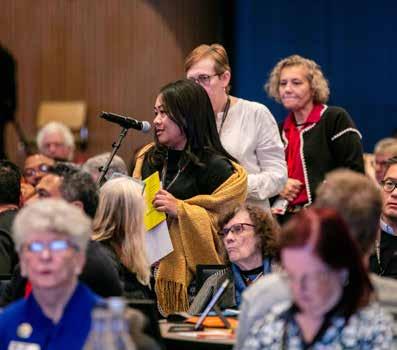

PROPOSAL FOR MINISTRY AND PLACEMENTS REVIEW GROUP PASSED BY SYNOD MEMBERS
A Proposal has been brought to Synod this year asking the Synod to set up a Ministry and Placements Review Group.
This Proposal for Ministry and Placements Review Group Passed by Synod Members on Day 3.
This group will look closely at how the Uniting Church in NSW and ACT places its ministers and supports them in their work.
The group has three main tasks:
1.Give guidance on what ministry means today. This includes thinking about how we understand “calling,” how everyone (not just ministers) shares in ministry, and how we can better support lay and ordained ministers.
2. Review the current placement system: This would mean gathering data about where ministers are placed, how long it takes to fill roles, how long ministers stay, their demographics, and what challenges affect their ability to move. The group would also look at how well current advertising works and get feedback from those involved.
3. Make recommendations for change.
This could include:
• Ways to get more people into ministry.
• Making sure lack of local funds doesn’t stop churches (especially in rural areas) from having a minister.
• Possible changes to placement rules, like how long someone can stay in a placement.
• Looking at whether more ministers should be based in presbyteries.
• Deciding if the broader national church should rethink how ministry roles work.
The proposal explains that problems in placing ministers aren’t new. The Uniting Church came from traditions that handled ministry differently:
• In the Reformed tradition, congregations called ministers directly, which sometimes led to long vacancies.
• In the Methodist tradition, ministers were appointed by a central body, ensuring every church had someone, even if it wasn’t always the perfect fit.
The proposal was passed by consensus on the last day of Synod on 13th July. By reviewing both history and current practice, the proposal hopes to find a better way to match ministers with churches—one that fits today’s needs and helps the church live out God's mission.
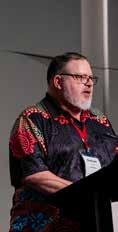
RENEWED HOPE AND GROWTH FOR UAICC
On Day 3 of Synod, Nathan Tyson, Head of First Peoples Strategy and Engagement, provided a key update on the Uniting Aboriginal and Islander Christian Congress (UAICC), reaffirming the Church’s covenant relationship with First Peoples—just days after the 31st anniversary of the 1994 Covenant signing.
RENEWED LEADERSHIP AND VISION
In December 2024, Pastor Tom Sloane and Nathan Tyson were appointed interim Co-Chairs of UAICC NSW/ACT, marking a new chapter focused on rebuilding governance and deepening community engagement. A statewide membership drive is planned for late 2025, leading to a UAICC gathering in 2026.
MINISTRY AND MILESTONES
The Synod honoured Pastor Beth Goolagong, who retired in April 2025 after 16 years of ministry. Pastor Tom and his wife Stella have moved to Condobolin to continue the work, while a new leader is being sought for Wellington. The Synod is also exploring a new UAICC Ministry Centre in Western Sydney.
WALKING TOGETHER IN ACTION
Progress under the Walking Together Action Plan 2024–2027 includes:
• A new Local Action Plan Template for congregations
• Free access to Aboriginal Cultural Capability online modules
• Walking on Country events in Woy Woy, Huskisson, and Dubbo
STRENGTHENING POLICY AND SUPPORT
Key developments include:
• 3% of property sale proceeds directed to Congress and First Peoples initiatives
• An Aboriginal Employment Strategy in development
• A review of procurement to support Aboriginal-owned businesses
NEW APPOINTMENT
Mikenzie (“Kenzie”) Ling, a Wiradjuri woman and theology graduate, joined the First Peoples team in December 2024, bringing broad experience and global First Nations connections.
LOOKING AHEAD
Since 1985, UAICC has been a prophetic voice and spiritual home for Aboriginal and Torres Strait Islander Christians. In 2025, it enters a new era with renewed purpose. The Synod remains committed to walking together in covenant, justice, and healing.

UNITING CHURCH SCHOOLS: DEEPENING FAITH IDENTITY
On Day 3 of Synod, Rev. Stuart Bollom presented the Uniting Church schools report, highlighting how schools in NSW and the ACT are re-examining what it means to be shaped by faith.
“We don’t ask for ATAR scores—we ask schools: Where is God?” said Rev. Bollom, noting the central role of chaplains in helping over 11,000 students explore faith in everyday life.
Co-written with chaplains Rev. Andrew Syme and Rev. Dr Rosalie MacLarty, the report outlined eight core characteristics of Uniting Church school identity: preaching the gospel, nurturing faith and wellbeing, engaging with First Peoples, valuing all people, embracing diversity, pursuing justice, listening to all voices, and tackling tough topics.
Examples include:
• Faith in action: Chapel services, Christian groups, and service projects that connect belief with real-life purpose.
• First Peoples engagement: Scholarships, staff roles, yarning circles, and cultural learning.
• Inclusion and diversity: Support for students of all abilities, LGBTQI+ inclusion, cultural celebrations, and refugee scholarships.
• Justice and environment: Student-led fundraising and sustainability initiatives.
• Open dialogue: Forums and classes on ethics, consent, and social issues.
Schools are also working to make their Uniting Church identity more visible and counter cultural pressures that conflict with Christian values.
Chaplains were especially praised for being the living bridge between church and school life. The focus now is not whether schools have a faith identity—but how they can deepen and express it for future generations.
APPOINTMENTS TO STANDING COMMITTEE AND ACOMP
The newly elected ACOMP Chair was announced at Synod 2025 to be Rev. Natasha He.
As well as the Chair of ACOMP, members voted to appoint a newly elected Synod Standing Committee (SSC) for the 2025–27 term has been announced. This group plays a vital role in governing the Synod between its full meetings, helping to guide the church through key decisions and developments.
Members were nominated based on clear eligibility criteria: nominees had to be members of the Synod, and their nomination required the support of two fellow Synod members.
Following a formal ballot process, the successful candidates are confirmed.
All incoming SSC members are expected to:
• Actively contribute to the committee's work
• Attend meetings regularly
• Prepare thoroughly for discussions
• Uphold the confidentiality of all matters, particularly those involving individual privacy or commercially sensitive issues related to the Synod, its boards, and agencies
Newly appointed members of SSC include:
Ex-Officio:
• Moderator - Rev. Mata HaveaHiliau
• Ex-Moderator - Rev. Simon Hansford
• Moderator - Elect - Rev. Pablo Nunez
• General Secretary - Rev. Jane Fry
• UFS Board - Rev. John Barker
• Synod Board - Ms Heather Watson
• Uniting Board - Ms Liz Nicol
Transition Commission Chair to be appointed by SSC
Presbytery Transition Leader North to be appointed by SSC
Presbytery Transition Leader
Central to be appointed by SSC
Presbytery Transition Leader
South to be appointed by SSC
Elected Synod 2023 (for 2 terms till 2027):
• Craig Corby
• Rev. Raymond Joso
Elected Synod 2025 (for 2 terms, subject to approval of 2027 Synod):
• Dr Denise Wood
• Rev. Sally Yabsley-Bell
• James Ellis
• Rev. Viniana Ravetali
Elected Synod 2025 (for 1 term):
• Barbara Moore
• Cecilia Russell
• Eidan Keiran
The ability of the newly formed Standing Committee to engage with significant change will be critically important to its decision-making in the term ahead.
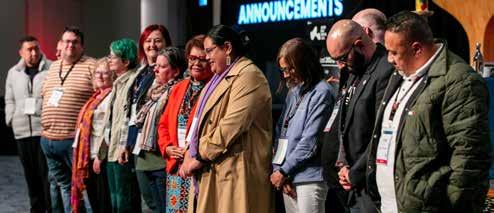
THREADS OF LOVE: HOW THE UNITING CHURCH IS WEAVING LOVE, JUSTICE AND HOPE
On Day 3 of Synod, President Rev. Charissa Suli and General Secretary Andrew Johnson presented the Assembly’s national report, reflecting a period of change and renewed purpose for the Uniting Church in Australia.
At the 17th Assembly in July 2024, Rev. Suli made history as the Church’s youngest and first person of colour to serve as President. Her theme, “Threads of Love: Weaving Christ’s love across cultures and boundaries,” now shapes the Assembly’s work.
KEY DEVELOPMENTS
• Act2 Project: Restructuring to strengthen faith communities, support lifelong learning, and share resources more fairly.
• Justice Commitments: Revived the Covenant with First Peoples, supported the UN Declaration on Indigenous Rights, affirmed genderdiverse members, and committed to net-zero emissions.
AGENCY IMPACT:
• Frontier Services deepened ties in remote Australia.
• UnitingCare Australia influenced national domestic violence policy and advocated for justice.
• UnitingWorld empowered Pacific women and equipped churches for global mission.
A CALL TO ACTION
Rev. Suli urged the Church to move beyond words—to tell the truth, pursue justice, grow as an intercultural community, and boldly respond to climate challenges.
LOOKING AHEAD
The Act2 Project continues to guide renewal through new commissions and broad collaboration. The Church faces challenges, but its direction is clear: stay grounded in Christ’s love and weave a community where all belong.

Working with nature against poverty

In West Papua, UnitingWorld is supporting our local church partner to fight poverty, tackle hunger and teach the next generation how to grow without harming creation.
In Sorong city, on the far west coast of West Papua, families gather in the back garden of Albert’s home to pray, hear a gospel story and share a meal. The humid air is heavy, the children restless in the heat.
Partway through, an Islamic call to prayer rings out over their heads from the scratchy loudspeakers of two nearby mosques. No one looks surprised. Albert calmly picks up his guitar and begins a hymn. Voices join one by one, filling the evening air with song.
Albert, an elder in our partner church GKI-TP*, has lived here all his life. Decades of migration have brought new neighbours and new rhythms and, while relationships between different faiths can be tense, he says there is mostly mutual respect.
Other challenges feel far more urgent.
“Right now we are losing the forests, rivers and reefs, and the culture and livelihoods that depend on them,” he says.
Sorong is surrounded by thousands of hectares of mangrove swamps, and further offshore lie some of the world’s last pristine coral reefs, havens for more than 1,200 species of marine life. These delicate ecosystems have supported sustainable livelihoods for generations,

from eco-tourism to small-scale fishing and farming.
That way of life is now under threat, from overfishing, overdevelopment, warmer currents, coral bleaching, and the expansion of nickel mining across eastern Indonesia. Mangroves that are nurseries for fish and protectors of coastlines are being cleared, reefs damaged and forests cleared for development.
As fish stocks start disappearing and people’s food gardens get washed away by floods and king tides, vulnerable communities are pushed deeper into poverty. People are forced to decide between protecting the nature they depend on or exploiting it to survive in the short term.
Albert understands the tension between human development and conservation better than anyone.
He once had a secure, well-paid job with one of the world’s largest mining companies operating in the highlands. But he began to ask himself, “Can we grow an economy from protecting nature rather than destroying it?” He left mining to dedicate his life to conservation and community education, which he sees as part of his Christian calling.
“Papuans call the forest ‘mama’, the coast ‘child’, and the sea ‘father’,” he says.
“These are sacred relationships. We have to protect them for the sake of our children’s future.”
Albert knows the roots of the challenges run deep. Weak leadership and shortterm economic decisions often favour quick cash from selling land or logging, rather than sustainable development. It’s why he sees the solution as both practical and pastoral, and so does our partner, GKI-TP.
With support from UnitingWorld, GKI-TP is working to help families overcome poverty and childhood malnutrition through nature-based solutions like climate-smart food gardens, sustainable small business training and market opportunities.
They’re also training conservation and advocacy champions to better understand the local impact of changing climate, their community members’ rights and responsibilities, and to take part in leading reforestation and adaptive agriculture.
“If we want the next generations to love and protect this land, we have to show them what it’s worth,” says Albert.
“It’s worth our culture, our food, our future. It’s worth everything. And time is running out.”




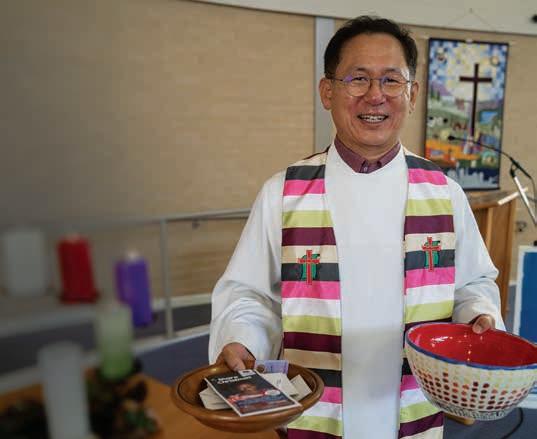
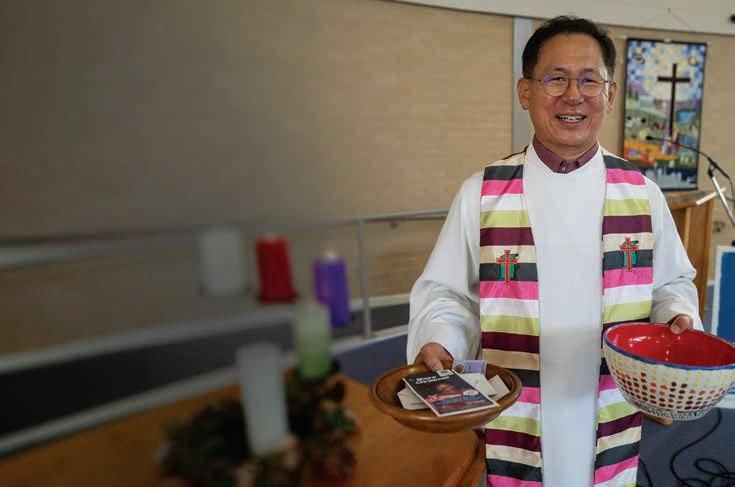
Littlejohn/Act for Peace
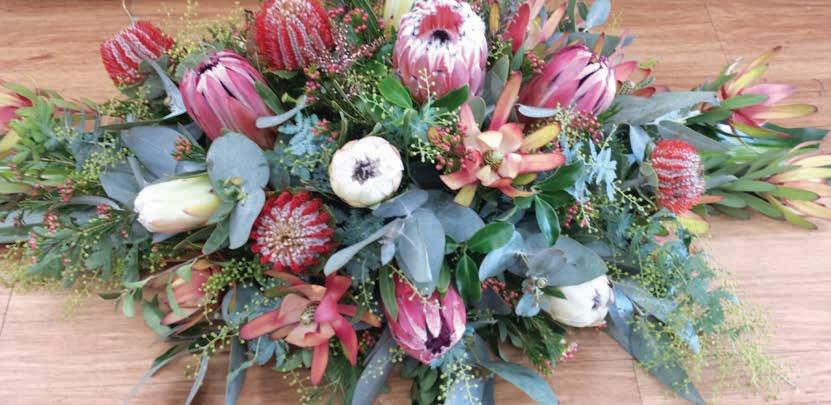
Joan Gillespie Remembering
Norman McDonald, a retired minister of the Uniting Church in Australia and former General Secretary (1988-2000), has recently offered a moving tribute to Joan Gillespie, reflecting on a working relationship and friendship that spanned nearly five decades.
Norman first met Joan in early 1977—just as the Uniting Church in Australia was being formed. At the time, Joan was representing the Canberra Presbytery through her near-monthly visits to the Synod office. Their paths continued to cross through various councils and committees, and over time, their professional relationship deepened.
Before Union in 1977, Joan had served as secretary to the Rev. Frank Butler, then Secretary of the Congregational Union of NSW. When Frank Butler became the General Secretary of the newly formed Synod of NSW, Joan continued in her role, bringing with her not only valuable administrative experience but also a calm, competent presence during a significant period of institutional transition. Little did Norman imagine then that she would later become his own secretary.
Reflecting on those years, Norman described it as a great time and himself as fortunate to have had Joan as both assistant and colleague.
But his recollections also carried sorrow. Norman shared that one of the most painful moments in his ministry came during a time of technological change, when computers were being introduced into workplaces, including the Synod office. Joan, deeply competent and still delivering high-quality work, was reluctant to transition to the new systems—and, truthfully, she had little need to. Her performance surpassed that of many computerised processes of the time.
JOAN WAS A WARM PRESENCE IN THE LIFE OF THE UNITING CHURCH
Joan’s early responsibilities were immense. She played a central role in building the administrative foundations for the Synod in NSW and the ACT—work that was crucial and painstaking. A great deal of what passed through the office at that time passed through Joan’s desk—and through her typewriter. Her attention to detail, her commitment to quality, and her high professional standards became benchmarks for all who followed.
Joan’s strengths, however, went beyond her technical competence. Norman recalled how much he appreciated her willingness to teach him the protocols of the office and her absolute discretion when dealing with sensitive matters. Joan’s capacity for respectful and confidential handling of complex issues was well recognised, not only by her colleagues but also by officers and members of congregations across the church and wider community.
Nevertheless, change was underway. In Norman’s words, “the times, they were a-changing,” and difficult decisions had to be made. He acknowledged the sadness of the day when it became necessary to let Joan go, describing it as one of the most difficult and distressing moments of his professional life—one without precedent, one he continues to reflect on with regret. If he could apologise again, he said, he would.
Joan Gillespie is remembered as a gracious lady. She was an excellent, meticulous, professional, and warm presence in the life of the Uniting Church—someone whose contribution to establishing the administrative infrastructure of the Synod of NSW and ACT was critical and carried out to the highest standard.
She is honoured and remembered alongside the significant servants of the Uniting Church.
Thank you, Joan Gillespie.
NORMAN MCDONALD

Rev. Dr Graeme Ferguson: A Visionary of Faith and Education
To understand the impact of Rev.Dr Graeme Ferguson on the Uniting Church in NSW, we must return to the hopeful 1970s, when a bold new indigenous church was being formed. Central to this vision was the uniting of theological education across Methodist, Presbyterian, and Congregational traditions—culminating in the founding of United Theological College (UTC) in 1975.
In a move as risky as it was inspired, the first principal chosen for UTC was a 39-year-old outsider: Graeme Ferguson. A New Zealander from the Presbyterian tradition, Ferguson brought with him a Cambridge PhD on Calvin, experience in refugee work in Berlin, and nearly a decade of innovative pastoral ministry at Kent Terrace Presbyterian Church in Wellington. There, he developed a theology deeply grounded in action: ‘The task of the Church is to discern the places in the life of the city where Christ is about his saving work and set out to join him there.’,
In Sydney, Ferguson faced the enormous task of unifying three academic faculties—each with its own traditions, expectations, and egos. He succeeded through a combination of intellectual depth, personal eccentricity, and an unwavering faith in the church’s mission. Known affectionately as “Ferg,” he had a gift for listening (even if it didn’t always seem that way) and making decisions with care and insight.
As colleague Geoff Barnes noted, Ferguson was a collegial leader who thrived on theological debate, welcomed advice, and carried a pulpit presence that, at times, left a deep spiritual impact. Though his lectures could be intellectually demanding, his mentorship was generous, and his belief in intelligent Christianity was contagious. Ferguson’s Synod speeches were legendary, and his deep compassion evident—especially when delivering difficult news to students. He embraced diversity ahead of his time. Many conservative students were bemused to receive an invitation into the Principal’s home addressed to themselves and their significant other. Former Moderator Simon Hansford recalls presenting himself to Ferguson at 19 with a story of his call to ministry. Simon spoke to a man who didn’t look him in the eye, but spent the conversation rolling and unrolling his tie. At the end of the conversation Simon received wise counsel, ‘Come back in five years.’ It was advice that shaped a calling.
Holiday stories from his family reflect both devotion and depth. During summers in Ulladulla, Ferguson would pack a full bookcase for his caravan, balancing theology with swimming, fishing, and preaching. His daughter remembered these holidays as filled with joy and learning.
As theological leader in NSW, Ferguson travelled extensively, bringing bold, often challenging ideas. When accused in a country town of speaking over people’s heads, he responded, ‘Well, raise up your heads!’ His later projects included helping establish the Centre for Ministry in North Parramatta and contributing to the founding of the Sydney College of Divinity. His global connections brought renowned scholars like Walter Brueggemann to Australia.
Rev. Dorothy McRae-McMahon captured Ferguson’s spirit in a retirement prayer: a man of ‘little pomposities’ and great tears, of ‘dry wit,’ ‘daring imagination,’ and ‘marvellous laugh.’ She recalled that he could ‘cry with you in his office one day and walk past you with great formality the next day, saying ‘Morning Ms McMahon’ as though he hardly knew you.’ She noted that he was deeply faithful to the gospel, with a ‘genuine loving kindness’.
In 1988, Ferguson returned to New Zealand for a final major role as minister at St David’s Presbyterian Church, Auckland. He brought the same mix of pastoral warmth and academic rigour to this role, serving until retirement in 2000. Even in retirement, he remained active—preaching, teaching, and advocating for justice, despite health challenges that would have stopped a lesser man. His last sermon, delivered on Waitangi Day 2025, was a passionate critique of the New Zealand government and a call for reconciliation.
Graeme Ferguson’s legacy is one of bold theological leadership, compassionate ministry, and deep joy. His life enriched the Uniting Church in NSW and beyond— and we are deeply grateful for him and his life of service.
MICHAEL THOMAS MINISTER AT CROWS NEST UNITING CHURCH

A MAN OF LITTLE POMPOSITIES AND GREAT TEARS, OF DRY WIT, DARING IMAGINATION, AND A MARVELLOUS LAUGH
God is...
YOUNG PEOPLE EXPLORE “WHAT GOD IS LIKE” AT CANBERRA REGION YOUTH EVENT
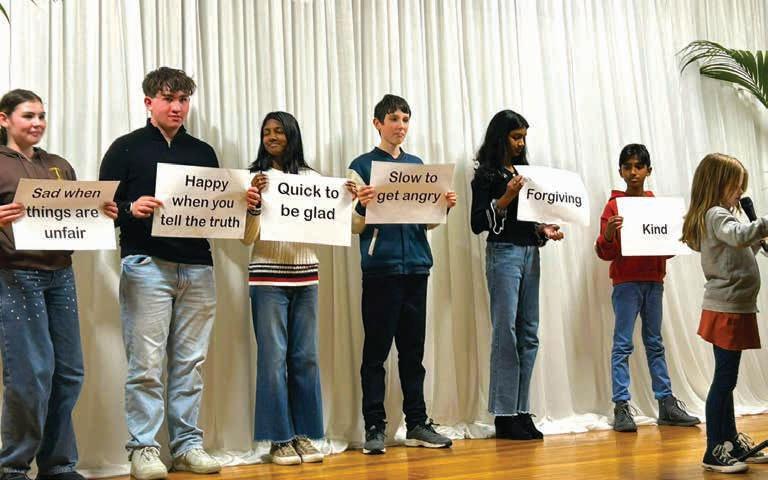
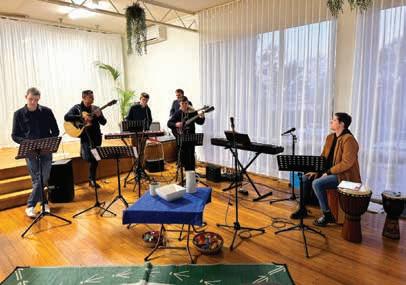
THEY BROUGHT TO LIFE THE WONDER, MYSTERY, AND KINDNESS OF GOD



Around 30 young people from across the Presbytery gathered at Sanctuary in Narrabundah (the former St Aidan’s Uniting Church) for an afternoon of workshops, worship, and fun – and they weren’t alone! About the same number of adults – parents, leaders, and supporters – also came along to cheer them on and be part of the celebration.
Importantly, this event wasn’t just dreamed up overnight. It came about after months of discussion and planning by youth and children’s ministry leaders from across the congregations of the Canberra Region Presbytery, who shared a vision to create space for young people to connect, create, and worship together. It was exciting to see so many congregations represented on the day, including Gungahlin, North Belconnen, Kippax, Canberra City, Wesley Forrest, Tuggeranong, the Molonglo Church Plant, Queanbeyan, and Yarralumla. We also had the joy of welcoming young people from other churches across Canberra, in a wonderful display of ecumenical friendship and unity. A huge thank you goes especially to Marike Jago, Luke Keenan, and the amazing group of volunteers who gave many hours of their time and energy to bring this event to life. It is hoped that this can become a regular and much-anticipated gathering for young people across the region.
The afternoon kicked off with a high-energy Worship Music Workshop, led by Tash Holmes, Uniting Creative Mission Catalyst, and ably supported by a fantastic music team from Quakers Hill Uniting Church. With Tash’s guidance, the involvement of Uniting Creative, and the Quakers Hill team’s musical gifts, the group explored how music can be more than just sound – it can be an invitation into worship, community, and connection with God.
After an impressive afternoon tea (where the catering team clearly outdid themselves!), the young people chose between two creative workshop streams: Visual Arts and Drama. In the Visual Arts space, young people rolled up their sleeves to design and paint vibrant banners, which later became central to the worship service. Meanwhile, in the Drama group, creativity took a theatrical turn as they prepared an enactment of the beautiful children’s book What is God Like? by Rachel Held Evans and Matthew Paul Turner. Through movement and storytelling, they brought to life the wonder, mystery, and kindness of God.
The day reached its high point with a well-attended Youth Worship Service, where the young people led the gathered community in singing, praying, laughing, and reflecting on the question: What is God like for us? Once again, the music was beautifully supported by the Quakers Hill team. Rev. James Aaron from the Pulse Team offered an encouraging message, inviting everyone to express their prayers by adding Lego pieces to a growing, colourful prayer tower – a powerful, tangible symbol of our shared faith, diversity, and creativity.
The evening finished the best way possible – with pizza, sushi, dessert, and lots of chatter and laughter echoing through the space. People left not only with full stomachs but also with hearts full of connection, joy, and a deeper sense of community.
A big thank you to the Pulse Team, Uniting Creative, the Quakers Hill music crew, volunteers, youth leaders, and all who came along — proving once again that when young people gather with open hearts and curious minds, something special happens.
JAMES ELLIS



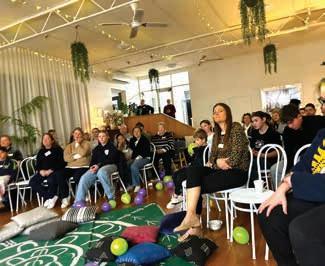
AcClimatise

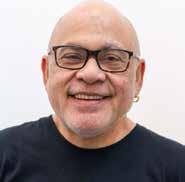
JIONE HAVEA
Mission Catalyst – Stewardship of the Earth
Climate change is one of the critical challenges of our time that needs to find more attention in worship events.
"The Lectionary is not tuned to the current realities of real life, such realities as bushfire season, hurricane season, the mourning of Indigenous people on Invasion Day," says author Jione Havea. "The project is an invitation and a dare, to make the lectionary see, hear and feel the conditions and the environment in which we live."
"In other words, to tune the lectionary to the conditions and the mournings of the earth."
"These reflections are offered to help advocate for climate justice," says Alimoni Taumoepeau.
"Please use these these reflections in your study groups and worship and service events. This is at the heart of our theme for Synod 2025 - Transforming Communities," says Moderator, Rev. Faaimata Havea Hiliau.
This conviction is behind the “Acclimatise (the) Lectionary” project, which will begin by providing weekly reflections to address the realities of climate change and the rise of climate injustice.
JIONE HAVEA
LECTIONARY REFLECTIONS
September: Formed and Shaped By God
Prepared by Rev. Dr Niall McKay
SEPTEMBER 7, PROPER 18
Jeremiah 18:1-11 and Psalm 139:1-6, 1318, Deuteronomy 30:15-20 and Psalm 1, Philemon 1:1-21, Luke 14:25-33
This week’s lectionary readings share a common thread: being shaped by God. In Jeremiah 18, Israel is likened to clay in God’s hands. Psalm 139 reminds us that God formed us and knew us before birth. Deuteronomy 30, Psalm 1, and Philemon 1 all speak to moral and spiritual formation—towards God, wisdom, blessing, and a new way of relating not as master and slave, but as brothers and sisters in Christ. Philemon is urged to receive Onesimus “no longer as a slave but more than a slave, a beloved brother… both in the flesh and in the Lord.”
Jesus takes this reshaping further, calling us to let go of anything—wealth, self-interest, even family ties—that hinders true discipleship. It’s a radical reframing of life, but one we trust will be good and God-shaped. In following Jesus, we believe something beautiful will emerge.
SEPTEMBER 14, PROPER 19
Numbers 21:4b-9 and Psalm 98:1-5 or Psalm 78:1-2, 34-38, 1 Corinthians 1:1824, John 3:13-17
John 3:16 is one of the most quoted verses in scripture, yet it follows a strange image: the “Son of Man” likened to a serpent in the wilderness. This points back to Numbers, where the Israelites, plagued by venomous snakes, are saved by looking at a bronze serpent lifted up by Moses—a scene that echoes the serpent in Eden and humanity’s original rebellion.
The imagery is complex, but the message is clear: God’s saving action must confront our deep tendency to seek salvation on our own terms. Again and again, we fail to trust God, turning back to the false safety of slavery, injustice, and despair. But God offers another way—first through Moses, showing that God's healing power triumphs over harm, and then fully through Jesus, who reveals a love strong enough to redeem the whole world from sin, evil, and temptation.
SEPTEMBER 21, PROPER 20
Jeremiah 8:18-9:1 and Psalm 79:1-9, Amos 8:4-7 and Psalm 113, 1 Timothy 2:1-7, Luke 16:1-13
The parable told at the start of Luke 16 is one that is difficult for us to make sense of. It tells of a manager of a property who is not doing his job well, and when he is told that he will be “let go”, he does “deals” with others to benefit himself to the detriment of the owner of the property. And yet, while at first the owner of the property is displeased with the manager’s work, this turns around when the manager does his deals. As a lesson in economics or even morality this parable is confusing.
IT’S A RADICAL REFRAMING OF LIFE, BUT ONE WE TRUST WILL BE GOOD AND GODSHAPED. IN FOLLOWING JESUS, WE BELIEVE SOMETHING BEAUTIFUL WILL EMERGE
Yet, in verse 13, we are reminded that the parable is more about allegiance than anything else – about making sure that God is our master rather than riches (mammon). In the end, it may be that the manager got it right. By doing deals he secured for himself enough to continue living, and even the possibility of ongoing relationships with other people in his community.
Whatever the case, it is important to realise that the kingdom of God is not a highly efficient economic machine, but rather a place where all people can find enough to live and where we open possibilities for new relationships – even when this seems to mean “breaking the rules”. A liberating lesson for a world where the systems of mammon are worshipped so readily.
SEPTEMBER 28, PROPER 21
Jeremiah 32:1-3a, 6-15 and Psalm 91:1-6, 14-16, Amos 6:1a, 4-7 and Psalm 146, 1 Timothy 6:6-19, Luke 16:19-31
The story of Lazarus and the rich man in Luke 16 builds on last week’s theme of loyalty to God over wealth—but here the consequences are unmistakable. It is the rich man’s wealth that leads him to Hades. There is no mercy offered, not even for his family. As a warning against the love of money and the devastation caused by inequality, the message is clear: the pursuit of riches has no place in God’s kingdom.
This is echoed in 1 Timothy 6. Wealth leads to ruin, but the faithful are called to be content with life’s essentials. Instead of accumulating riches, we are urged to be “rich in good works, generous, and ready to share.” It’s a vision of godly economics—one rooted in faith and obedience to Christ, rejecting the false gods of greed and excess, and working toward a world where everyone has enough.
October: Hope is Found in Standing Firm
OCTOBER 19, PROPER 24
Jeremiah 31:27-34 and Psalm 119:97104, Genesis 32:22-31 and Psalm 121, 2 Timothy 3:14-4:5, Luke 18:1-8
The readings from Genesis and Luke offer surprising insights into how we engage with authority—even God’s. It’s rare to hear a sermon urging us to demand something from God, yet both Jacob and the persistent widow are affirmed for doing just that.
ANY GENUINE CRY FOR JUSTICE AND BLESSING IS HEARD. MAY WE WAIT ON GOD WITH THAT SAME PERSISTENT HOPE
OCTOBER 5, PROPER 22
Lamentations 1:1-6 and Lamentations 3:19-26 or Psalm 137, Habakkuk 1:1-4; 2:1-4 and Psalm 37:1-9, 2 Timothy 1:1-14, Luke 17:5-10
This week the readings from the Old Testament all seem to reflect on suffering in some way. From the despair of exile and “affliction” in Lamentations, to the weeping for a lost home in Psalm 137, and the evil and destruction of injustice that causes Habakkuk to cry to God for relief, the scriptures for this week plead for God’s intervention. For some (like Habakkuk), hope is found in standing firm in the face of violence. But, for others (like the writer of Psalm 37), the response to suffering is to wait and trust in the Lord – at least for now.
In Luke 17, faith is shown to be powerful in itself: “If you had faith the size of a mustard seed, you could…” What is hinted at elsewhere in Scripture is made explicit here—faith isn’t just about enduring suffering; it’s the very means by which believers are empowered to act with God’s strength.
At the same time, Jesus pushes back against any sense of entitlement— against the idea that God works only for or through a chosen few. True faith is expansive and inclusive. When we try to limit God’s work to ourselves, we
lose sight of divine goodness and risk becoming agents of the very harm we once cried out against.
OCTOBER 12, PROPER 23
Jeremiah 29:1, 4-7 and Psalm 66:1-12, 2 Kings 5:1-3, 7-15c and Psalm 111, 2 Timothy 2:8-15, Luke 17:11-19
Last week’s readings focused on faithful responses to suffering and injustice. This week, the focus shifts to simply getting on with life. In Jeremiah, the exiled people are told to build homes, plant gardens, and settle in. Psalm 66 calls all the earth to rejoice in God’s power—even as enemies “cringe” before the Lord. The hardship hasn’t vanished—the people are still in exile, surrounded by powerful nations. Yet scripture reminds us that in the midst of suffering, we are still called to embrace life with joy.
The readings from 2 Kings and Luke reinforce this hope, showing that God’s healing is not limited to a chosen few. Naaman, a foreign military commander, and a Samaritan man—both outsiders— are healed. And it’s the outsider who responds with the clearest gratitude. Even in exile, even among enemies, God’s grace can bring healing. May our witness to Christ be just as widereaching and radical.
Jesus reminds us that God is always present in suffering and hears the cries of the oppressed—but the act of crying out matters too. The problem arises when our demands stem from selfishness, fear, or a desire to avoid faithful living. Then, even if we invoke God’s name, we resemble the selfcentred judge more than the widow. If Jacob had demanded wealth or power, his plea might have crossed into blasphemy. But because he wrestled with God in pursuit of blessing, his struggle is honoured. Scripture leaves no doubt: any genuine cry for justice and blessing is heard. May we wait on God with that same persistent hope.
OCTOBER 26, PROPER 25
Joel 2:23-32 and Psalm 65, Sirach 35:1217 or Jeremiah 14:7-10, 19-22 and Psalm 84:1-7, 2 Timothy 4:6-8, 16-18, Luke 18:9-14
The readings from Luke and 2 Timothy both raise the question: how are our lives justified? In the epistle, it's through a life of faithfulness—“fighting the good fight” and “running the race.” In the gospel, justification comes not through action but through the tax collector’s honest admission of his need for God.
These differing views reflect a deeper tension in the church: do our actions justify us? If so, how?
While this reflection can’t fully resolve that question, both passages highlight the importance of truthfulness. Paul (or his follower) speaks honestly of a life lived in faith, worthy of celebration. The tax collector speaks honestly of his sin, unlike the Pharisee who sees no need for grace. Whether through humble confession or faithful service, justification begins with a truthful reckoning of our lives before God.
LECTIONARY
November: Seeing and Being Seen
NOVEMBER 2, PROPER 26
Habakkuk 1:1-4; 2:1-4 and Psalm 119:137-144, Isaiah 1:10-18 and Psalm 32:1-7, 2 Thessalonians 1:1-4, 11-12, Luke 19:1-10
This week’s readings explore how we respond to sin, evil, violence, and injustice. Habakkuk urges us to “stand at the watch post,” holding firm against strife. Isaiah calls us to reject empty rituals and live a “cleaner” life—doing good, seeking justice, rescuing the oppressed, defending the orphan, and pleading for the widow. In Zacchaeus’s story, the call to do good springs from an encounter with Jesus. Drawn to see him, Zacchaeus climbs a tree—only for Jesus to see him first. That moment changes everything.
It’s easy for Christians to leap to ethics and politics without pausing for these moments of seeing and being seen—of recognising Christ and having our shame transformed by God’s gaze. May we make space for such encounters, letting our actions flow from the joy and grace God gives to all the beloved.
NOVEMBER 9, PROPER 27
Haggai 1:15b-2:9 and Psalm 145:1-5, 1721 or Psalm 98, Job 19:23-27a and Psalm 17:1-9, 2 Thessalonians 2:1-5, 13-17, Luke 20:27-38
Luke 20 offers one of Scripture’s clearest glimpses of how God sees time, the universe, and everything. In answer to the Sadducees’ “gotcha” question, Jesus describes “life in that age”—the age of the resurrection still to come. There, the usual order of life and relationships, including marriage, no longer applies. It’s not replaced so much as it ceases to have meaning.
The Sadducees found this mysterious, and so do we. Yet in that mystery lies a promise. Reflecting on Moses and the burning bush, Jesus affirms that in God’s presence, Abraham, Isaac, and Jacob are somehow alive too. Time collapses, and all life across space and history is gathered in God. We glimpse this glory only briefly in our age, but the resurrection promises that time’s marks—decay, decline, destruction, and above all death—will be gone forever.
NOVEMBER 16, PROPER 28
Isaiah 65:17-25 and Isaiah 12, Malachi 4:1-2a and Psalm 98, 2 Thessalonians 3:6-13, Luke 21:5-19
Reading Luke 21, the “calamitous future” Jesus describes feels less like a single moment in history and more like a sweeping portrait of human life. Have there ever been no wars, no uprisings, no famine or plague?
Christians can fall into reading these apocalyptic words as predictions to decipher, hoping to foresee—or avoid— what’s coming. While it’s natural to want to avert disaster or escape persecution, Jesus’ message here is not about avoiding but enduring: resting in God’s wisdom and trusting Him amid hatred and betrayal.
The first hearers may have believed the end was only months or years away, yet the Gospel has sustained believers through centuries. In our own age, when the future feels uncertain and control elusive, we too can find strength by resting again in God’s wisdom and enduring in faith.
NOVEMBER 23, REIGN OF CHRIST – PROPER 29
Jeremiah 23:1-6 and Luke 1:6879, Jeremiah 23:1-6 and Psalm 46, Colossians 1:11-20, Luke 23:33-43
The final Sunday of the church year is often called the festival of “Christ the King.” While the New Testament affirms Christ’s sovereignty, what that means is less clear—and today’s readings offer varied images.
In Jeremiah 23, the “righteous branch of David” reigns like a shepherd caring for sheep. In Luke 1, the saviour appears as the ultimate prophet, calling people from sin and revealing God’s glory. Psalm 46 speaks of refuge and safety, hinting at a strong protector. Colossians 1 shows Jesus as sovereign God, present in and through all creation. And in Luke 23, he is a broken man on a cross, yet still full of mercy.
We can’t hold all these images at once, nor are we meant to. But if we proclaim Jesus as sovereign over all, we must remember he is a king like no other—one who keeps surprising us with power, grace, and love. A fitting way to end the year.
NOVEMBER 30, ADVENT 1
Isaiah 2:1-5, Psalm 122, Romans 13:11-14, Matthew 24:36-44
It’s curious that the church year—and our preparation for Christmas—often begins apocalyptically. Matthew 24 speaks of “the day and hour no one knows,” recalls the flood, warns of sudden separations, and even ends with a tale of burglary. Such language can tempt us to fear, retreating into safe, insular “holy huddles.” Yet that is the opposite of Jesus’ command: “Keep awake!” Stay alert, engaged, and aware of the world. Paired with the Gospel’s repeated “Do not be afraid,” these verses invite wonder and readiness, not dread.
As we prepare for Christ’s coming, the point is not to fret over whether we are “in” or “out” of God’s kingdom, but to stay awake to his presence in the world and in our lives—ready to respond with hope and joy.
Lectionary Reflections are based on the Revised Common Lectionary and have been prepared by Rev. Dr Niall McKay, Educator for Lifelong Learning

What Superman Says About
Strength, Vulnerability and Faith
When the first trailer for James Gunn’s Superman (2025) was released, it did more than stir excitement—it exposed deep cultural fault lines. While some welcomed a more emotionally aware Clark Kent, others dismissed him as “too soft,” “too emotional,” or “woke.”
The backlash wasn’t really about camera angles or costumes. It was about masculinity—and what we believe a man is supposed to be.
“A cringe and woke Superman shows emotion after being distressed…” one Reddit user scoffed.
This reaction, while harsh, is revealing. It exposes an ongoing battle over what it means to be a man in today’s world. And for people of faith, it raises a deeper question: What does God say about manhood?
For decades, popular culture has fed men a steady diet of stoicism and self-reliance. The dominant ideal—what sociologists like R.W. Connell call “hegemonic masculinity”— teaches that real men don’t cry, don’t ask for help, and certainly don’t show weakness. That kind of man is strong because he’s closed off, invulnerable, unshakable. But James Gunn’s Superman challenges that image.
His Superman is still strong—but also kind. Still powerful—but unafraid to show hurt. He protects not with bravado but with empathy. He reflects what some psychologists call masculine flexibility—a healthier, more emotionally intelligent expression of manhood that makes space for vulnerability, compassion, and care.
And while critics say that’s unheroic, research says otherwise. Emotional intelligence—traits like empathy, selfawareness, and the ability to express one’s feelings—correlate with stronger relationships, better mental health, and more effective leadership. And, dare we say, a more Christlike posture.
As Christians, we follow a Saviour who wept (John 11:35), who asked friends to stay near him when he was overwhelmed with grief (Mark 14:3334), and who, even in his resurrection, carried the scars of suffering (John 20:27). Jesus did not hide his humanity. He embraced it. And in doing so, he redefined what true strength looks like.
The apostle Paul wrote, “When I am weak, then I am strong” (2 Corinthians 12:10). That’s not just spiritual paradox— it’s a radical reframe of power. Strength, in God’s economy, is not control but surrender. Not dominance, but service. Not hardness, but love.
Gunn’s Superman, who centers kindness and vulnerability, may not be explicitly Christian, but his portrayal echoes this biblical vision of masculinity. He is not less of a man because he shows emotion. He is more of one.
Let’s not forget that Superman has always been an immigrant, a refugee raised by adoptive parents, trying to live with integrity in a world that often misunderstands him. Created by Jewish immigrants Jerry Siegel and Joe Shuster in 1938, Superman was a response to the turbulence of their time—a longing for justice, moral clarity, and hope.
In 2025, Gunn’s version revives that origin story with fresh urgency. He leans into Superman’s outsider status, not to diminish him but to deepen him. A man who understands suffering is more likely to walk alongside the suffering. A hero who cries may be the one who can comfort those who do.
Isn’t that what God calls us to do?
“Rejoice with those who rejoice, mourn with those who mourn” (Romans 12:15). Real strength isn’t emotional detachment. It’s emotional presence.
For men of faith—especially fathers, pastors, and mentors—Gunn’s Superman offers a conversation starter. What are we teaching our sons about manhood? Are we equipping them to express anger but not grief? Are we raising warriors, but not peacemakers?
The emotional backlash to this new Superman is telling. It’s not just discomfort with a new movie—it’s discomfort with the idea that gentleness and masculinity can co-exist. That’s a cultural script worth challenging.
The Bible doesn’t glorify emotional repression. It points us to a God who is “gracious and compassionate, slow to anger and abounding in love” (Psalm 145:8). A God who models both justice and mercy. We reflect God’s image best not when we harden ourselves, but when we allow our hearts to remain soft.
Gunn’s Superman may not be the last word on masculinity, but he’s part of a needed shift. He opens the door to reimagining what heroism—and manhood—can look like. For people of faith, that’s not just an artistic opportunity—it’s a spiritual one.
To echo Micah 6:8: What does the Lord require of men? “To act justly and to love mercy and to walk humbly with your God.” Maybe, just maybe, this Superman gets us a little closer to that vision.
ADRIAN DRAYTON

Vivid, Artful, Imperfect, and Worth Your Time
The
Chosen is back, and this time, it walks straight into the heartbreak and weight of Holy Week
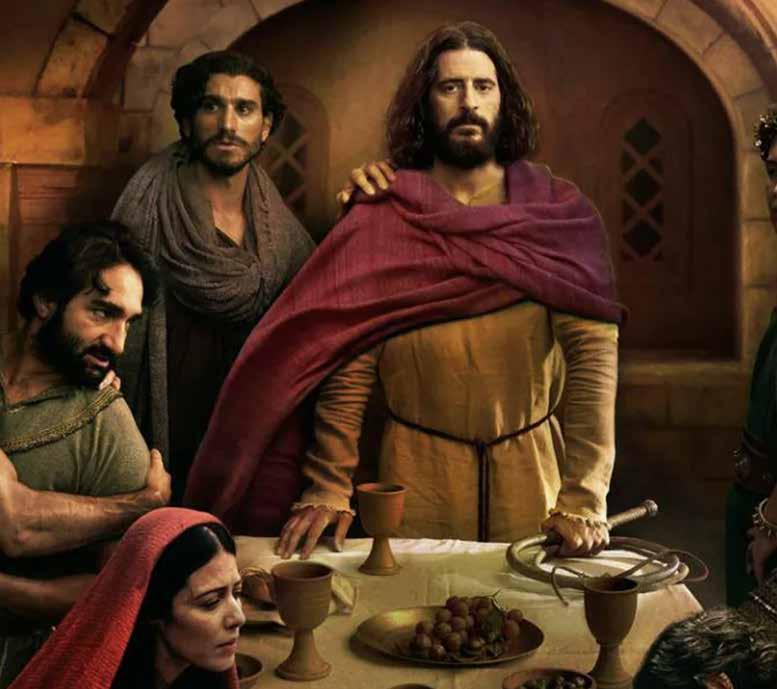
THE CROSS IS COMING. AND YET, THERE’S STILL ROOM FOR COMPASSION, BEAUTY, AND FRIENDSHIP ALONG THE WAY
The Chosen's Season 5 doesn’t reinvent the story of Jesus’ final days. But it doesn’t need to. Instead, it slows down and leans in. It gives space to grief, confusion, fear, and hope. You might already know every moment—Palm Sunday, the Last Supper, Judas’ betrayal—but this season invites you to feel them again.
The strength of the show has always been its characters. And here, the cast feels more grounded than ever. Jesus, played by Jonathan Roumie, is still gentle and warm. But now he’s wearier. He knows what’s coming. And so do we. That weight hangs over every scene. The disciples are more fully drawn, too. Their faith is real, but it’s not easy. They’re bold one minute, unsure the next. It’s messy. It feels honest. What makes Season 5 work isn’t just the emotion. It’s how the show uses stillness. Some of the best scenes are the quiet ones—conversations in back rooms, glances exchanged in passing, moments of doubt and prayer. The writing doesn’t push too hard. It lets the actors carry the weight.
Visually, Season 5 is striking. The Jerusalem sets feel alive—crowded, hot, unpredictable. The triumphal entry into the city is bold, but not overdone. There’s a tension in the air that doesn’t let up. The camera often lingers just long enough to let the viewer feel what’s unsaid.
The show doesn’t shy away from the hard parts of the Gospel. Judas isn’t just a villain; he’s a man with a mission who thinks he’s doing the right thing. Peter wrestles with his pride. Mary, mother of Jesus, carries sorrow in her eyes long before the cross. And Jesus himself is not distant. He laughs, weeps, bleeds, and breaks bread with his friends. He’s divine, yes—but he’s also fully human here.
Some Christian shows can feel like sermons with costumes. The Chosen avoids that. It’s artful but not showy, emotional but not manipulative. It trusts the story of Jesus is already powerful—it just needs to be told with care.
What stands out most is how The Chosen treats faith. It’s not a weapon, and it’s not a slogan. It’s a relationship that gets tested. The disciples argue. They misunderstand Jesus. They ask honest questions. And still, they follow. That’s where the show earns its weight—by showing faith that struggles, not just faith that preaches.
Season 5 covers a lot of ground and ends on a note of deep tension. The cross is coming. And yet, there’s still room for compassion, beauty, and friendship along the way. You know how it ends. But you’ll want to walk the road again.
Since it launched in 2019, The Chosen has drawn a large and loyal audience. The show’s team estimates that around 280 million people have watched it across platforms like Netflix, Amazon Prime Video, and its own app. Viewers have connected with its grounded, culturally aware take on Jesus and his disciples, along with its high production quality. It’s now the mosttranslated TV show in history, available in over 50 languages. Led by creator Dallas Jenkins, the team has crowdfunded close to $100 million so far, with plans to complete seven full seasons.
ADRIAN DRAYTON
You can watch every season of The Chosen with an Amazon Prime subscription.

PreachFest
Ancient Futures
24/25 OCT 2025
St Stephen's Uniting Church
PreachFest is for anyone who shares in this gift of proclamation. The conference is grounded in worship, aiming to uplift and inspire all participants.
This year’s PreachFest theme is Ancient Futures. We honour the voices and faithful witnesses of those who came before us, connecting them to our participation in service in the future hope of reconciliation and the renewal of all things in Christ.
Keynote Speakers

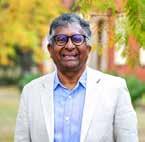
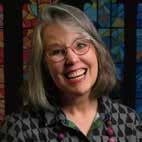
At PreachFest you can expect inspirational keynote sessions, workshops, and spaces for conversation, reflection and networking. Our speakers and workshop leaders include Bible and Theology teachers, preachers, and those who train others in preaching.
Monica Jyotsna Melanchthon
Stan Grant
Rev. Dr Anna Carter Florence
Rev. Prof. Sathi Clarke




